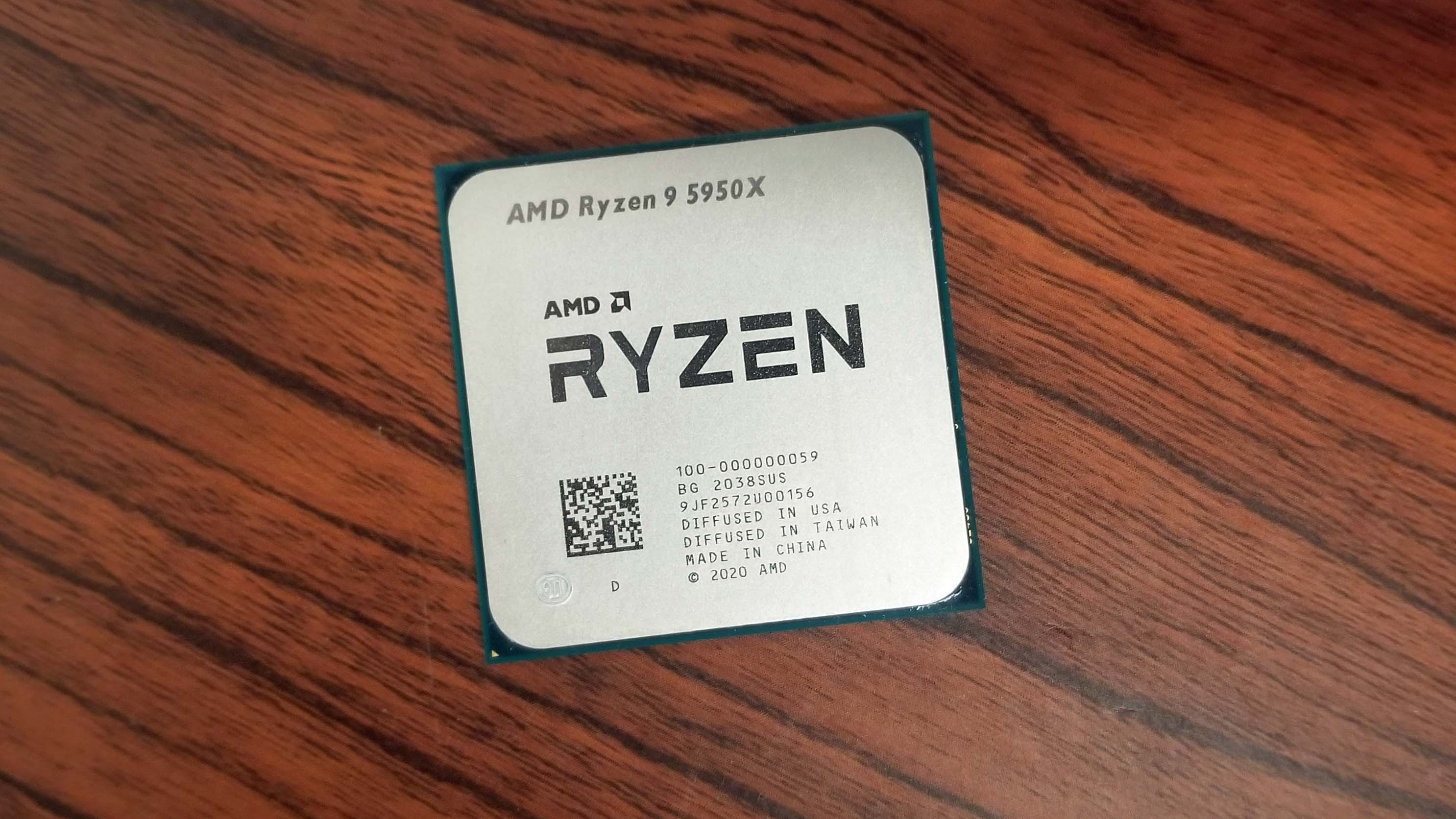Why you can trust Tom's Hardware
Ryzen 9 5950X and Ryzen 9 5900X Application Benchmarks
The TLDR
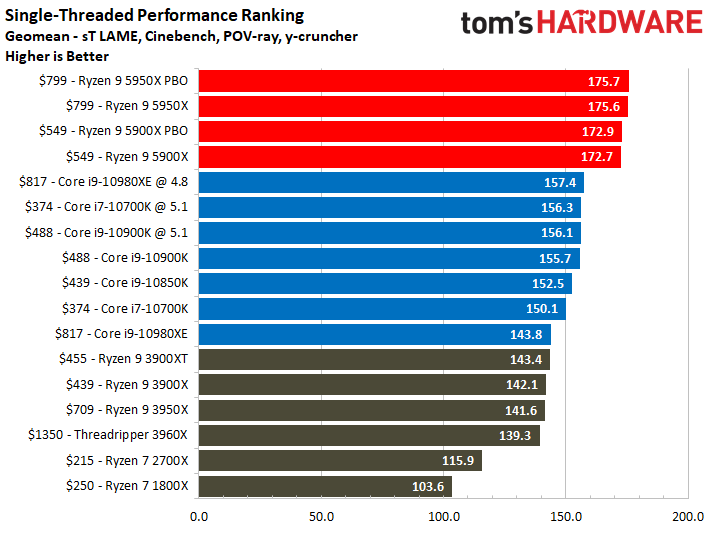
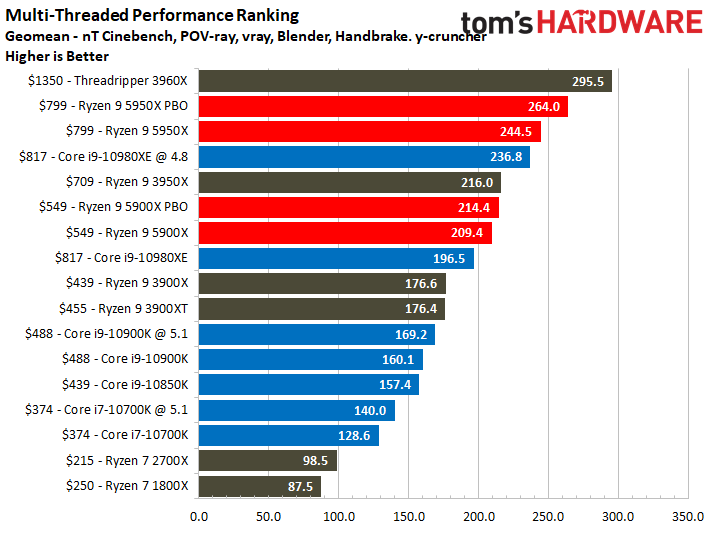
The geometric mean of both the most lightly- and heavily-threaded tests in our application suite speak volumes. We're quite accustomed to seeing AMD's chips lead in the multi-threaded rankings while trailing, sometimes by sizeable margins, in the single-threaded performance ranking. That isn't the case anymore, as Zen 3 easily leads both rankings.
Some lightly-threaded workloads, like Cinebench and LAME, respond so well to the Zen 3 architecture that it grants AMD a massive lead in the overall rankings. But as you'll see, while the Zen 3 chips excel tremendously at some applications, they also don't suffer from terrible performance in others as we see with Threadripper.
Rendering Benchmarks on Ryzen 9 5950X and Ryzen 9 5900X
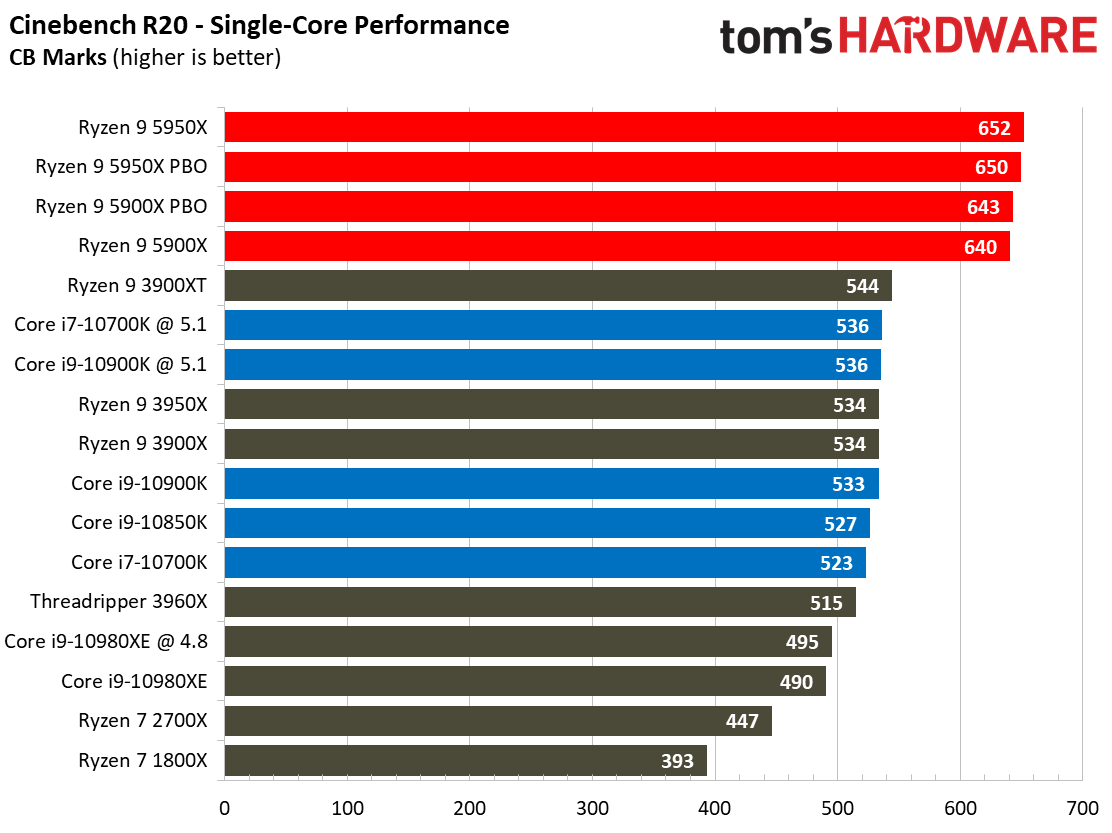
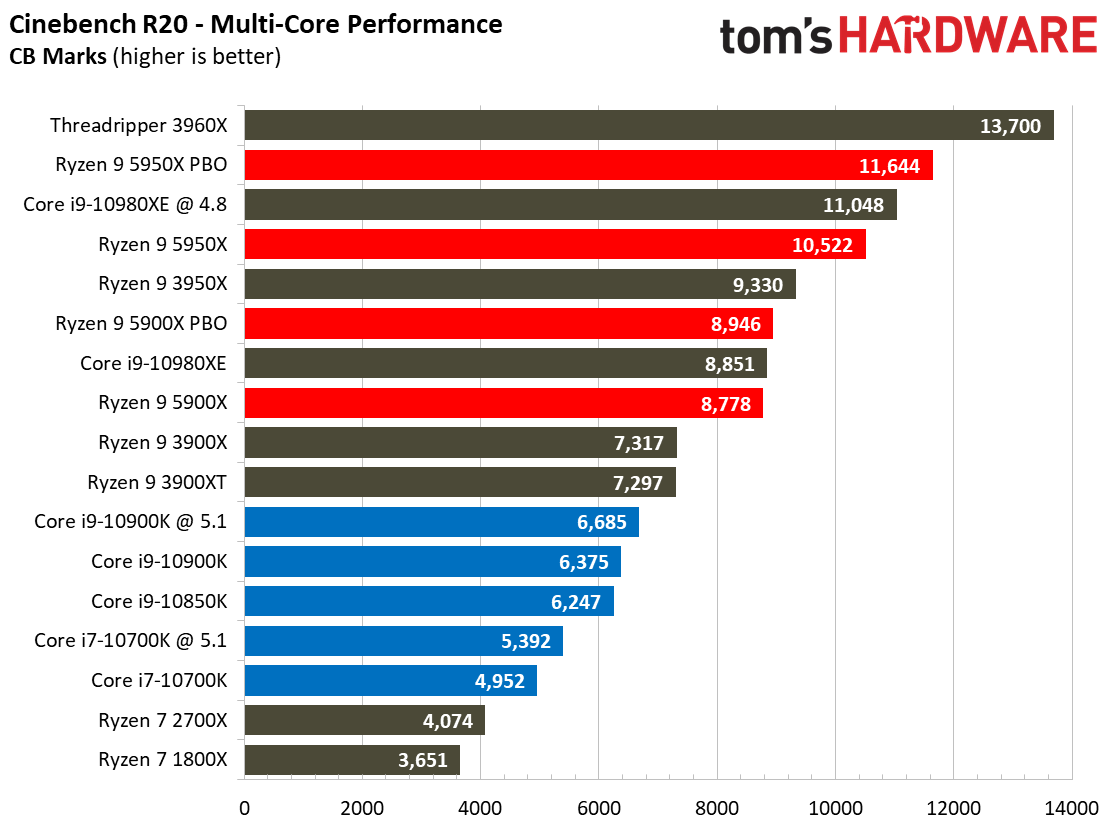
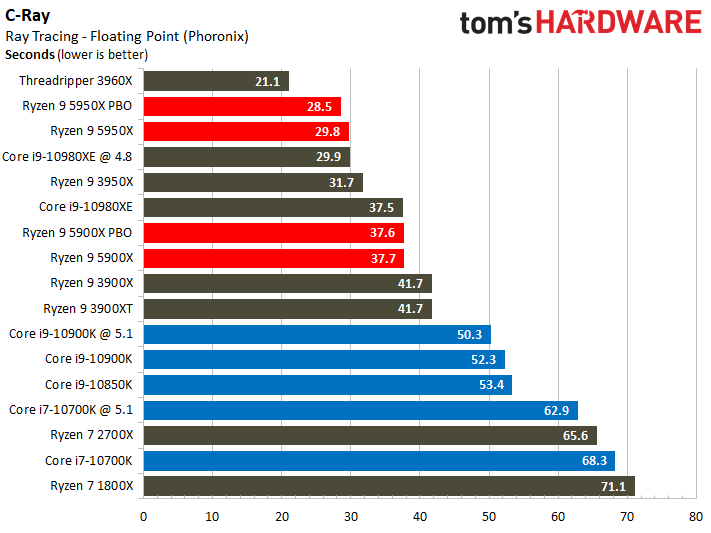
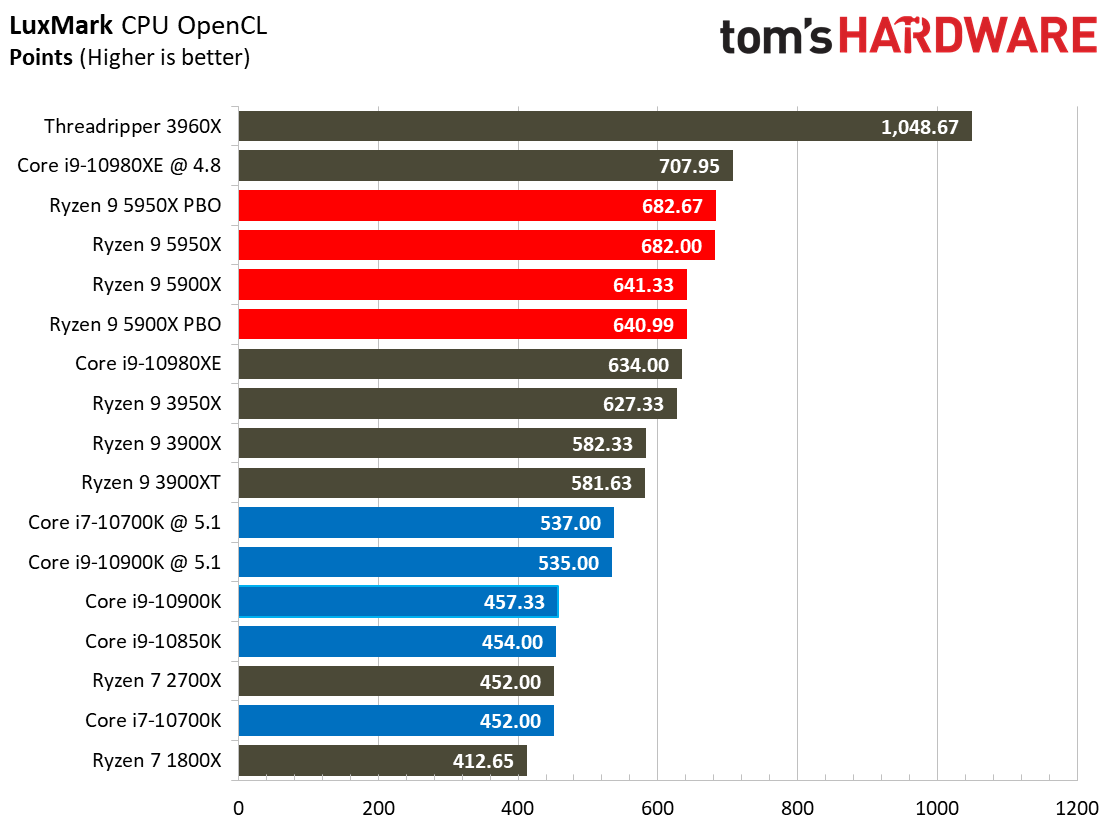
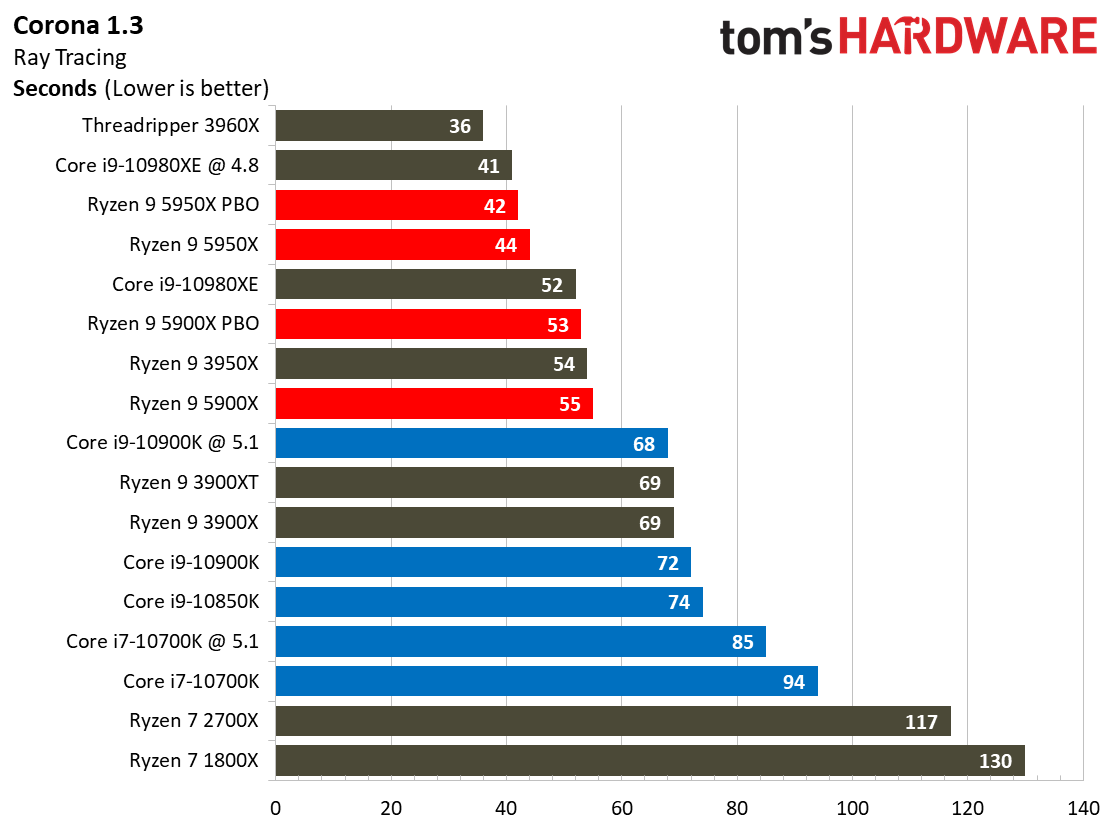
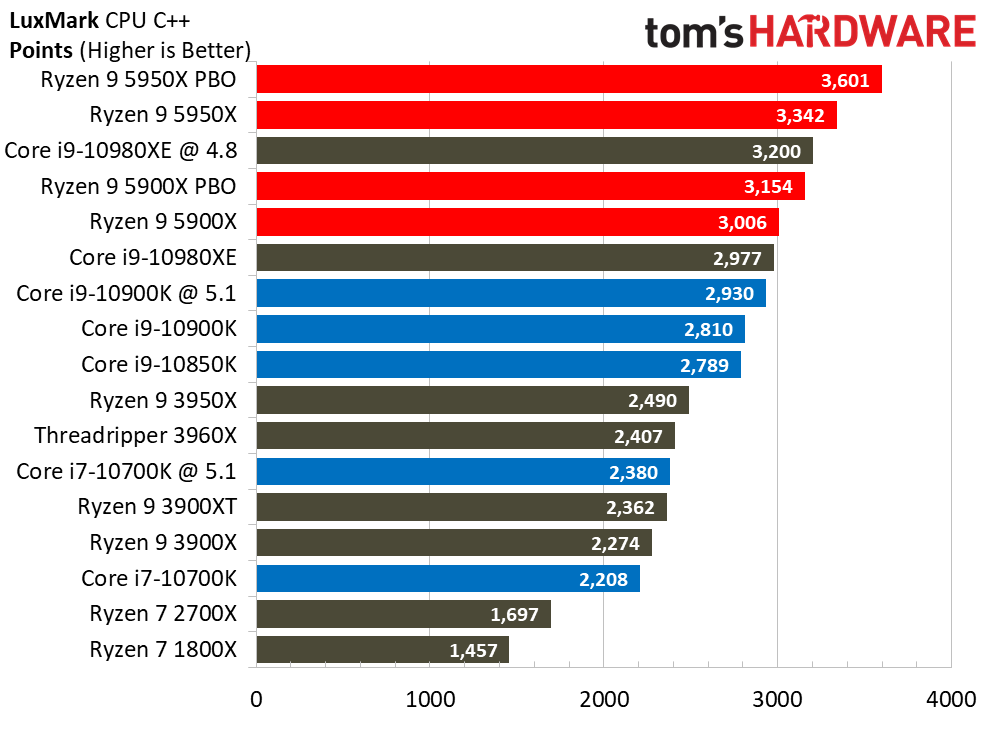
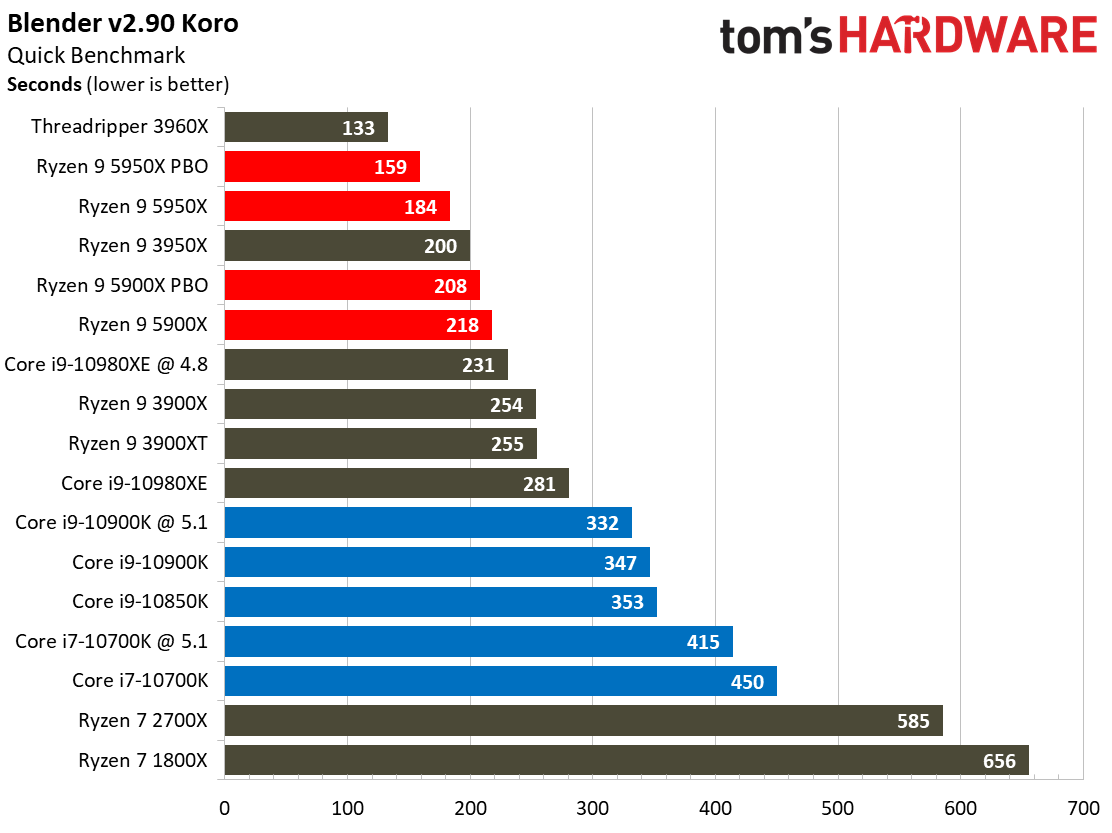
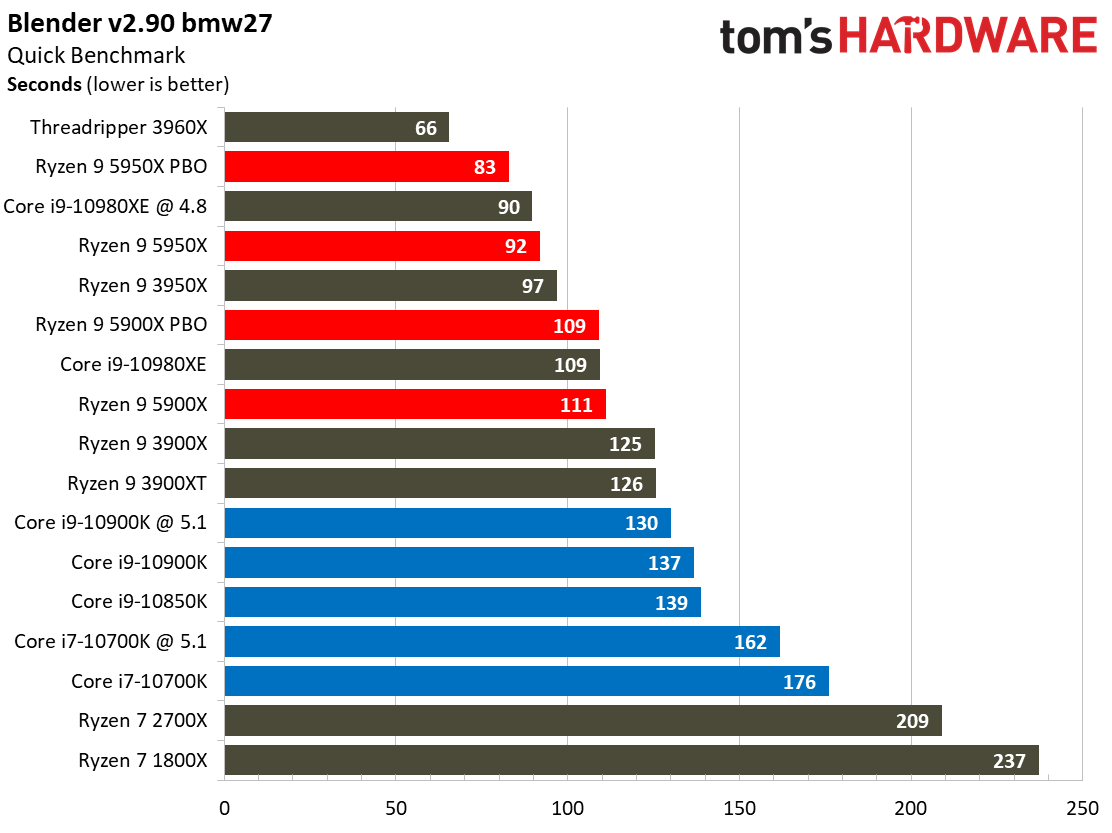
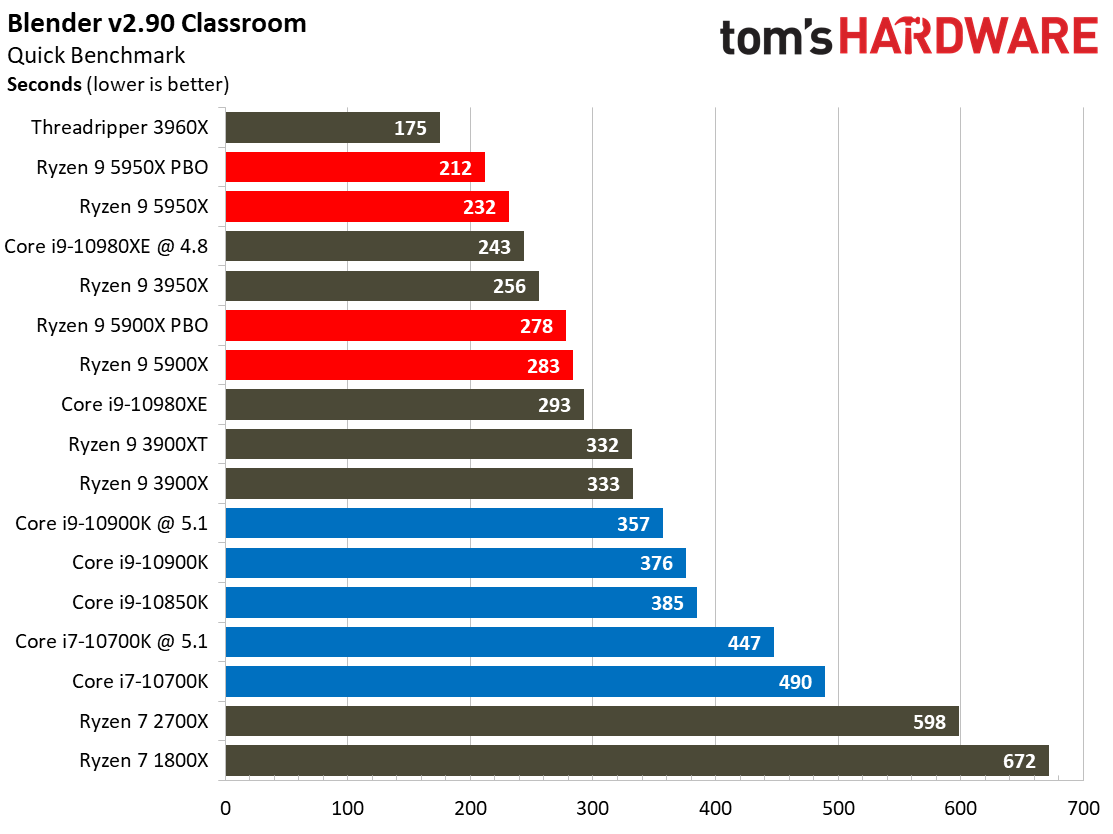
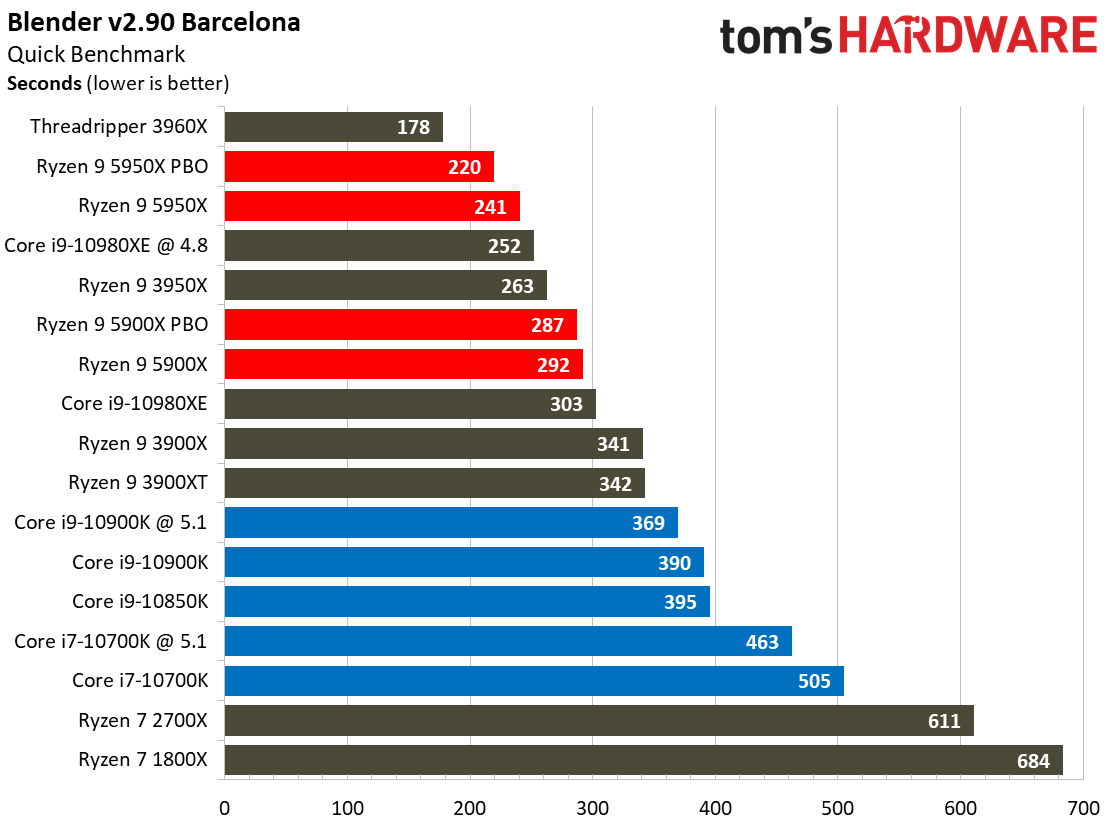
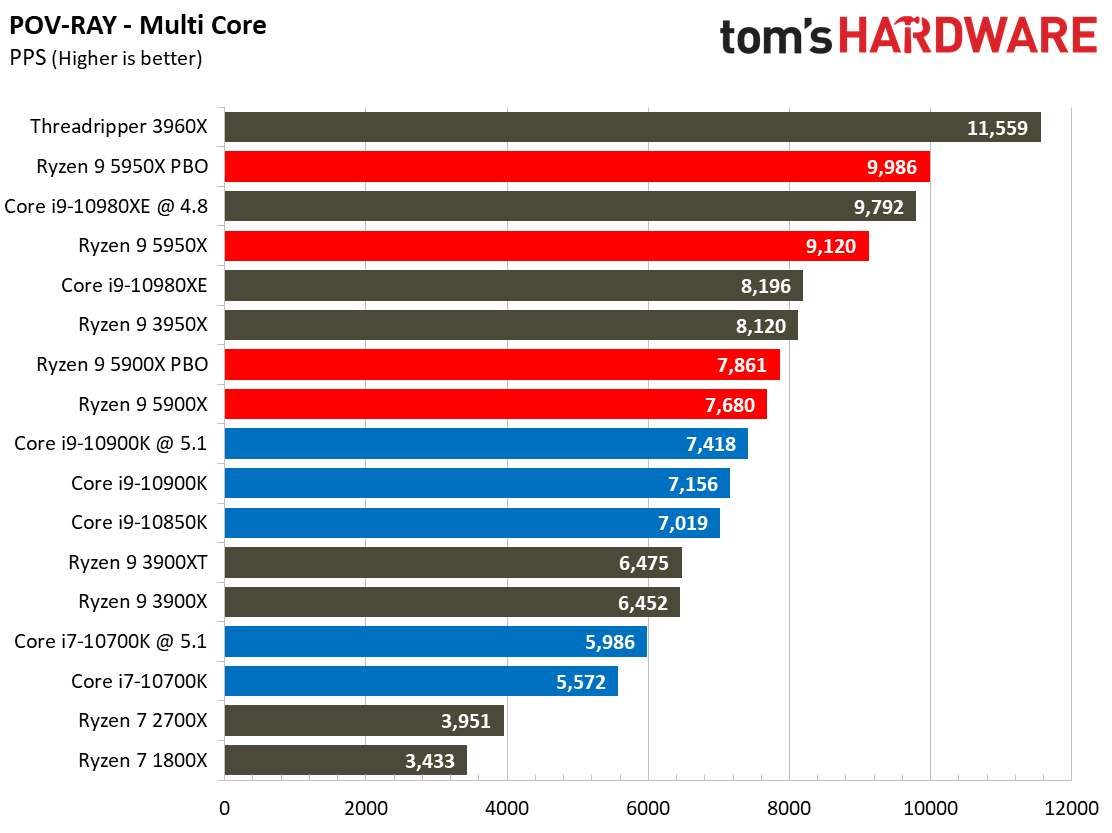
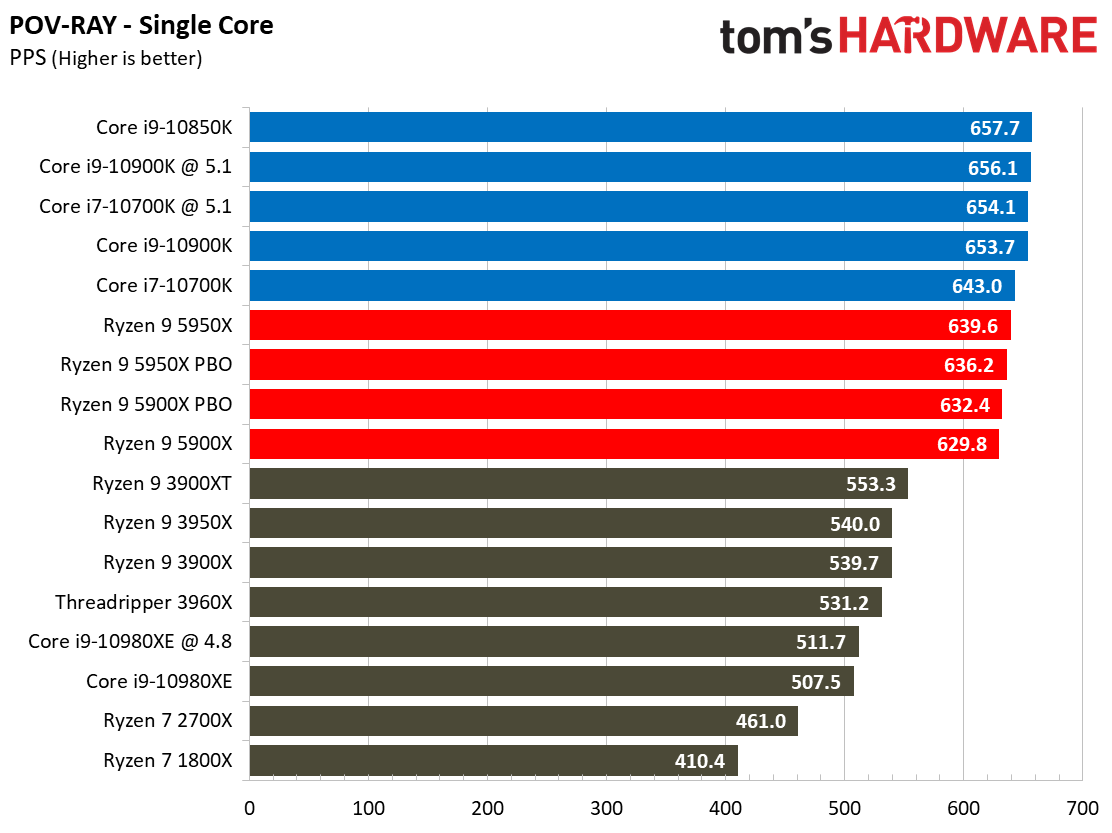
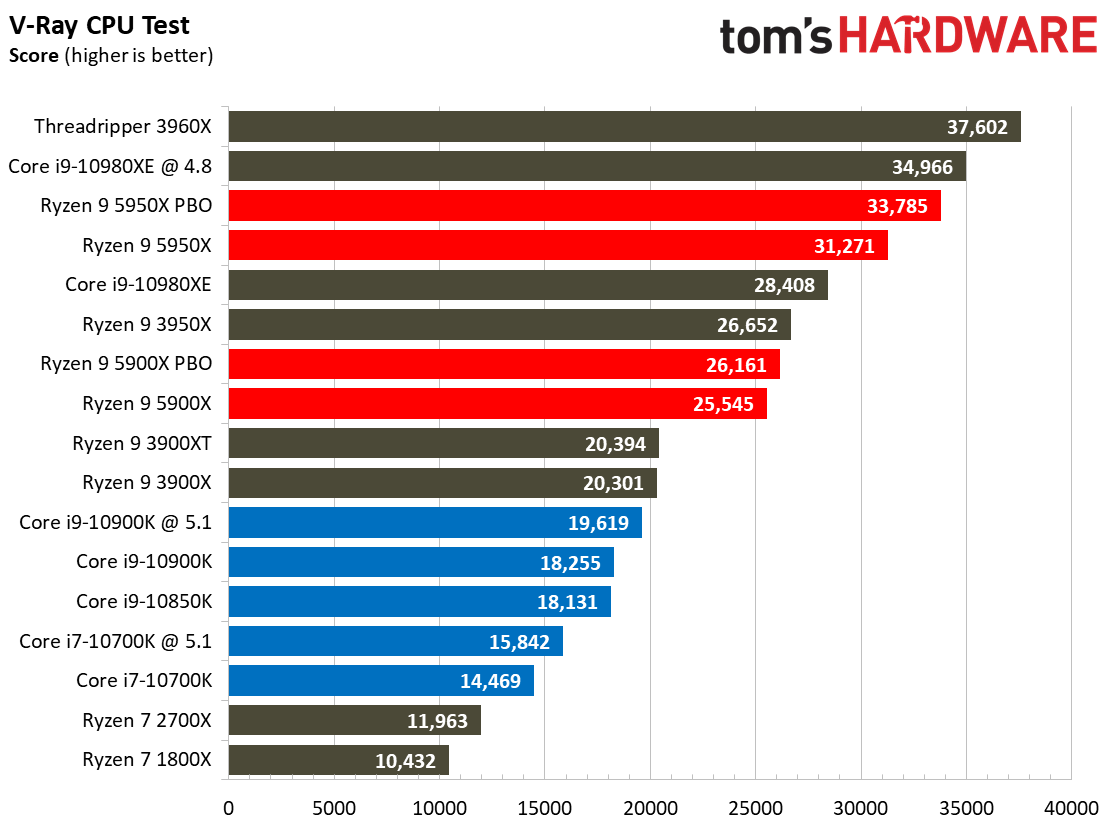
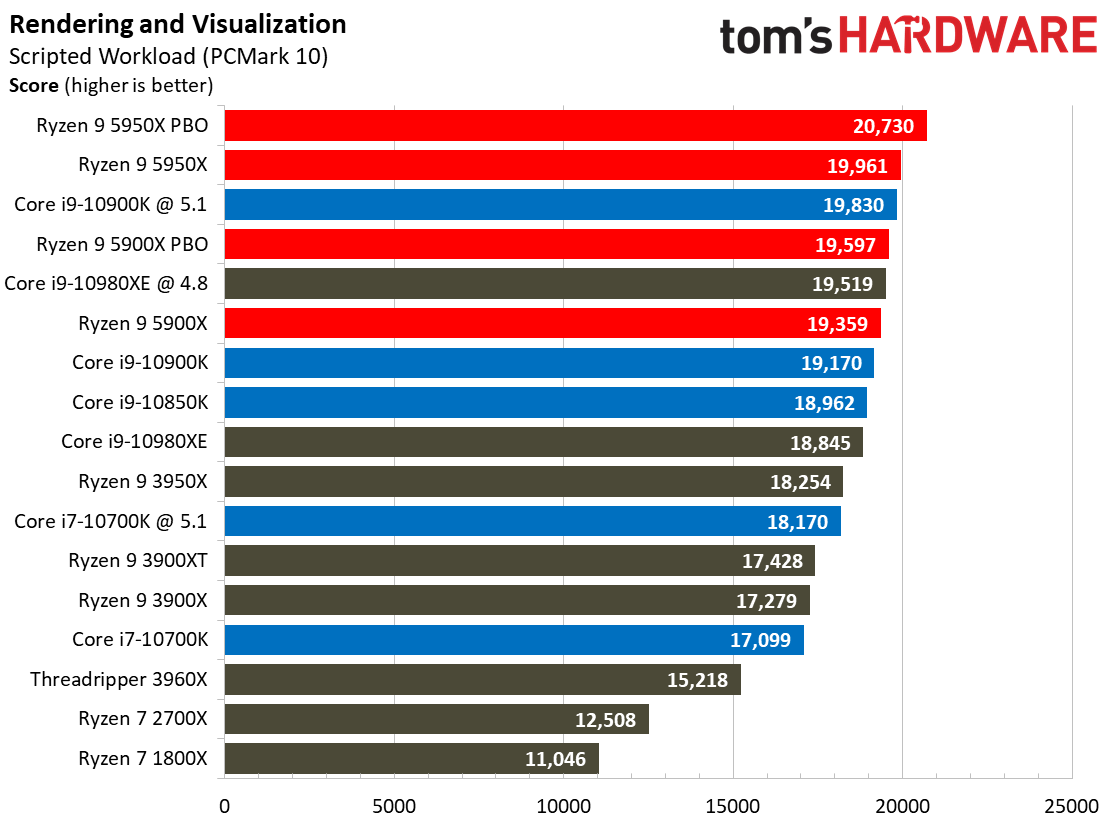
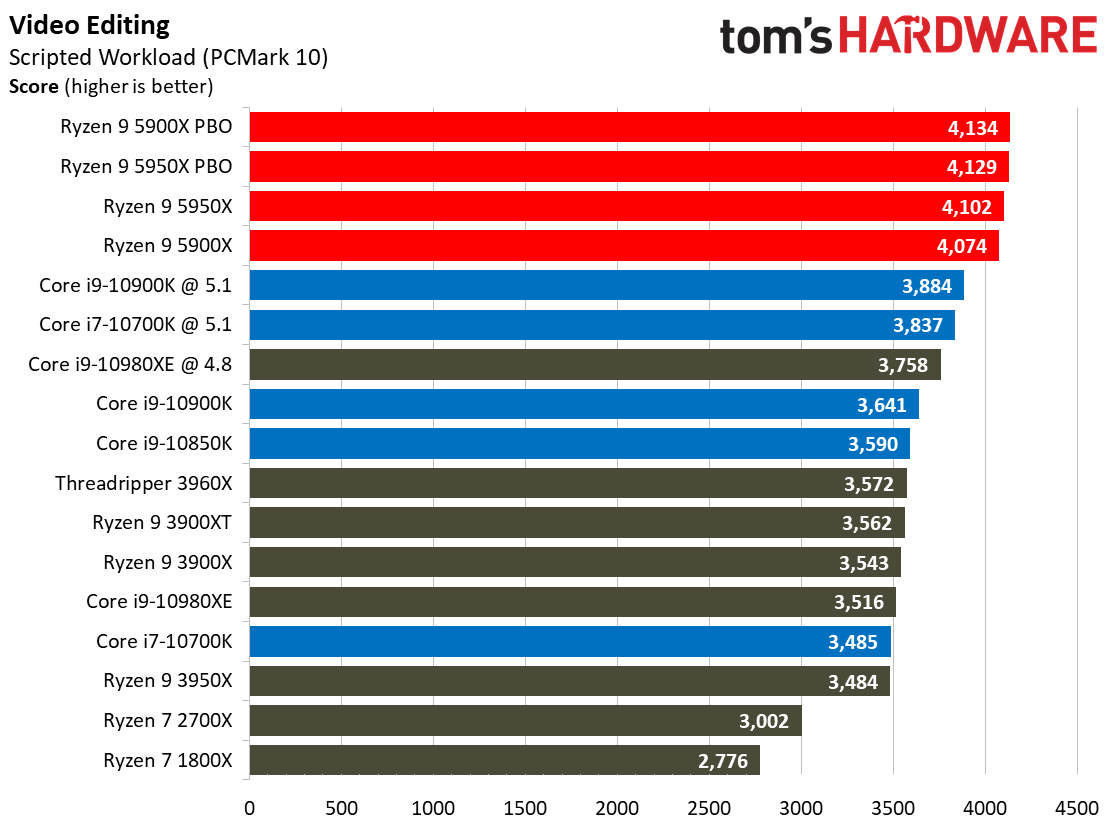
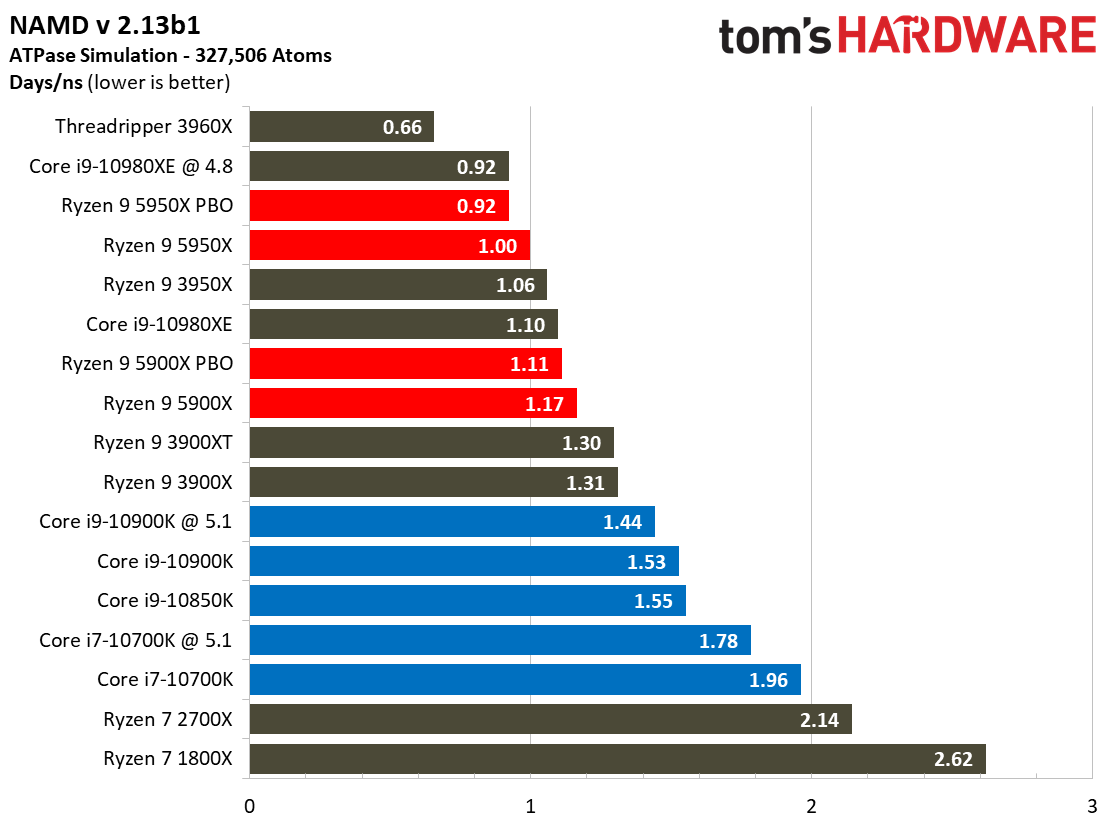
Cinebench has long been AMD's favorite benchmark for a simple reason; the Zen microarchitecture has always performed extremely well in the threaded benchmark. However, AMD has steadily improved its performance in the single-threaded benchmark as well, slowly working its way up the chart.
Apparently those days of small jumps are over, as the Ryzen 9 5950X notches a 20% lead over the 3900XT. That's an incredible gen-on-gen improvement in single-threaded performance. The 5950X also takes a 13% lead over the previous-gen 3950X in the multi-threaded test, which is equally impressive given that both chips have the same 142W power limitation.
Intel's chips take the lead in the single-threaded POV-Ray test, but the remainder of these tests favor the Zen 3 processors by significant margins.
Encoding Benchmarks on Ryzen 9 5950X and Ryzen 9 5900X
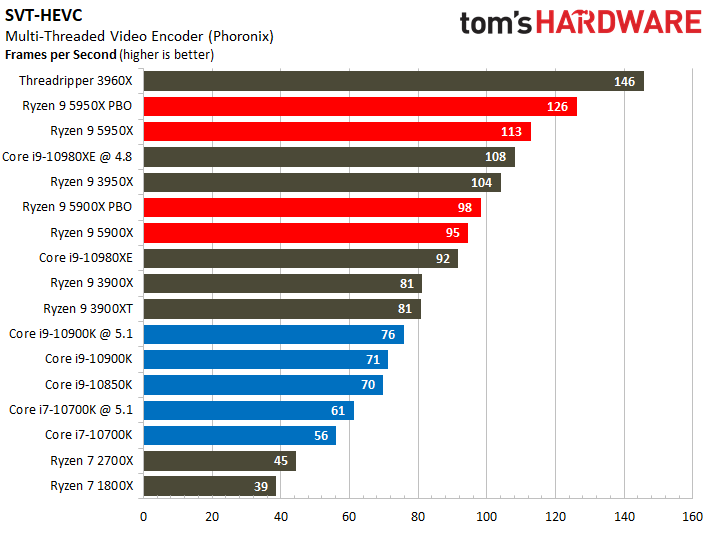
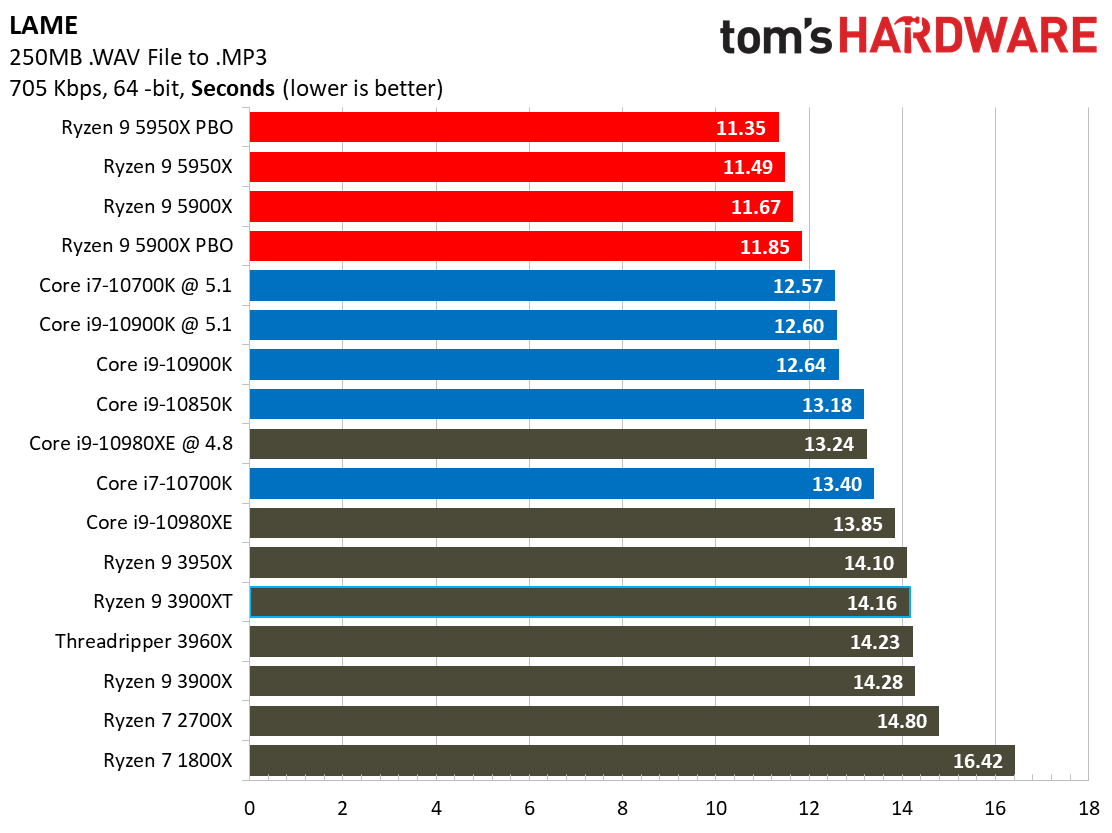
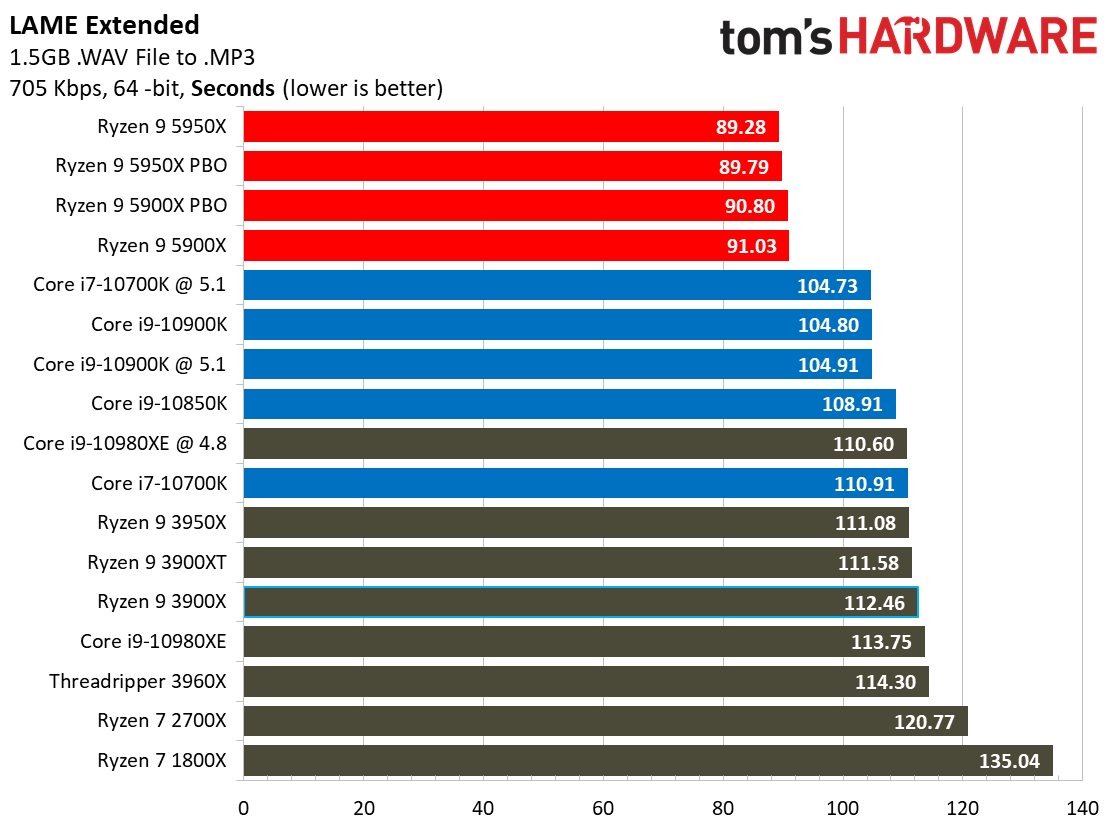
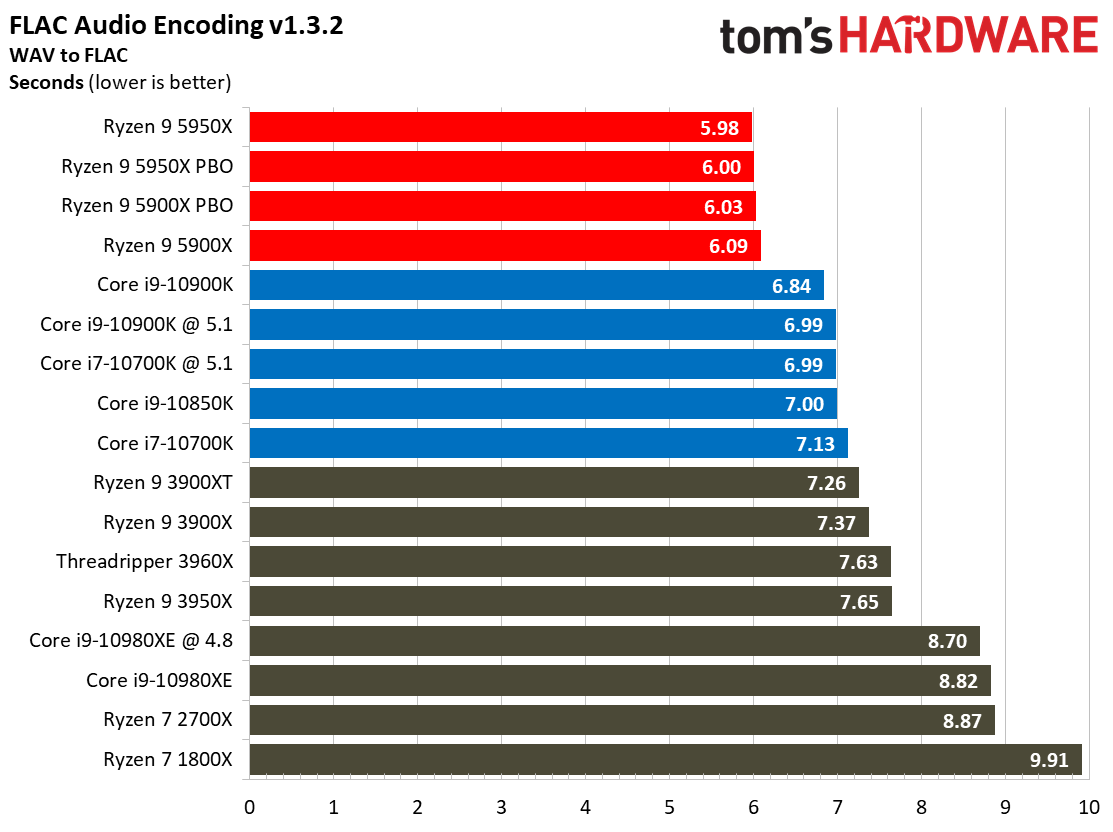
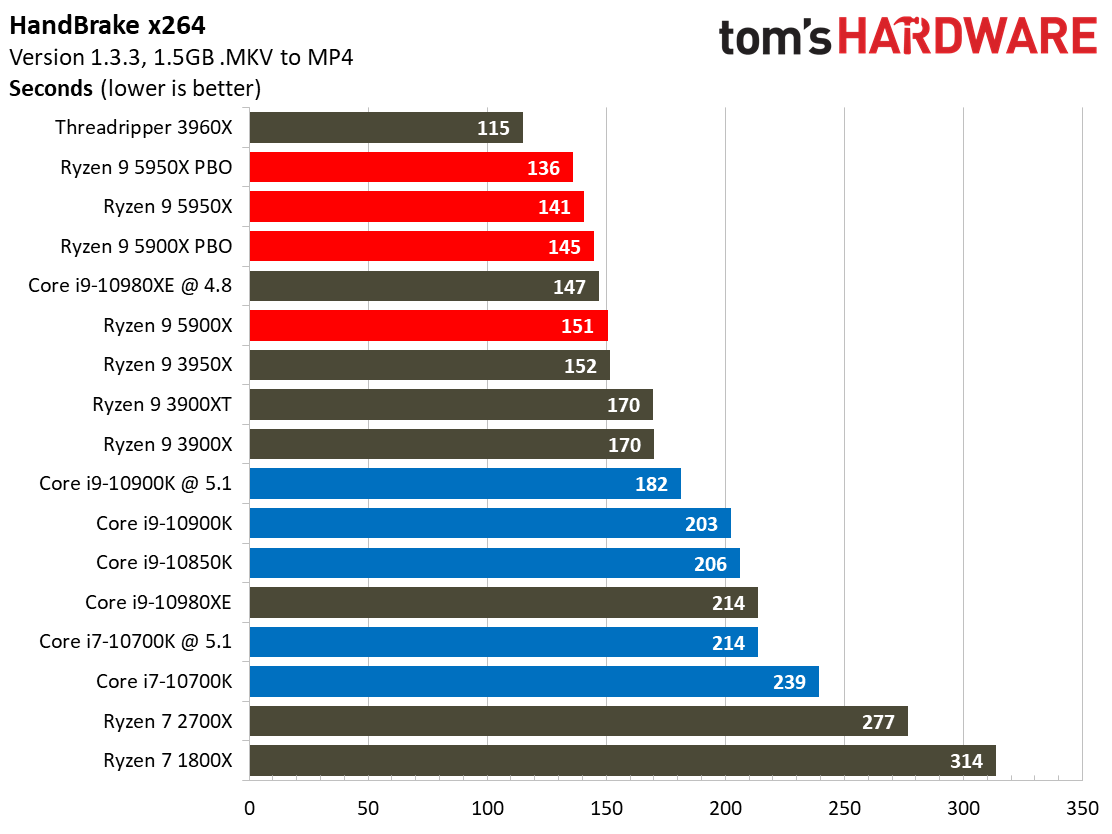
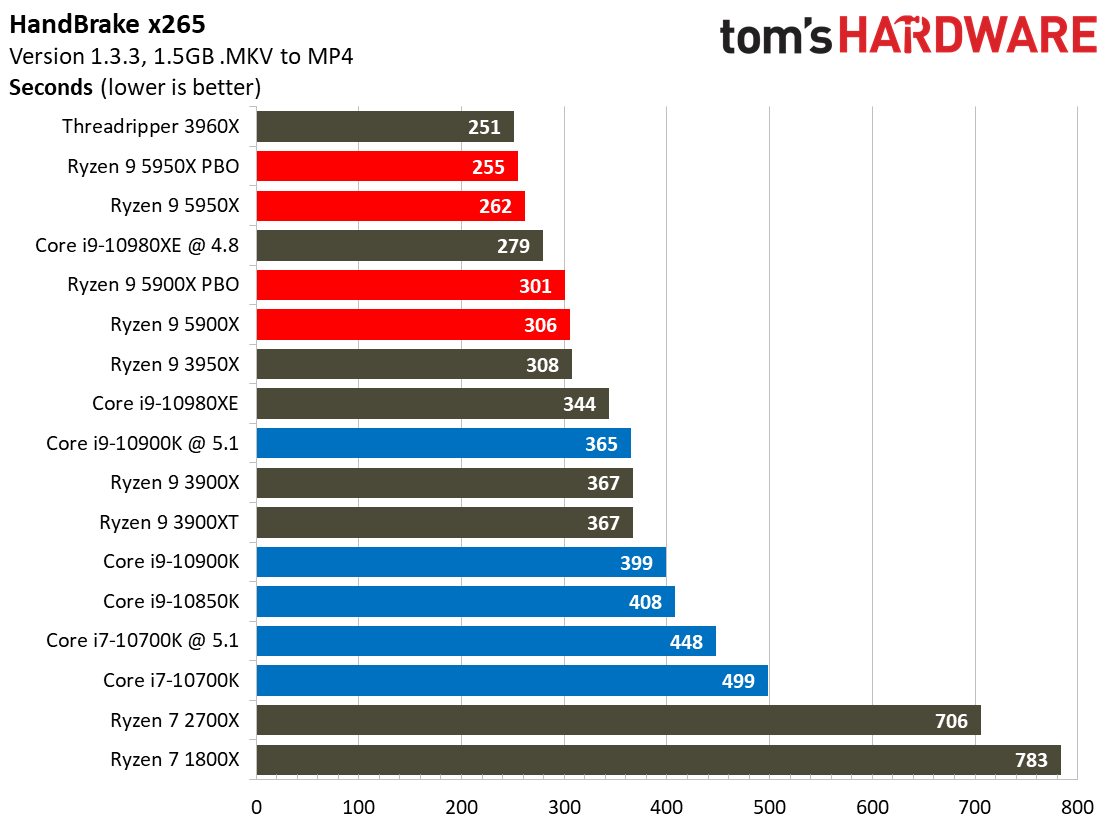
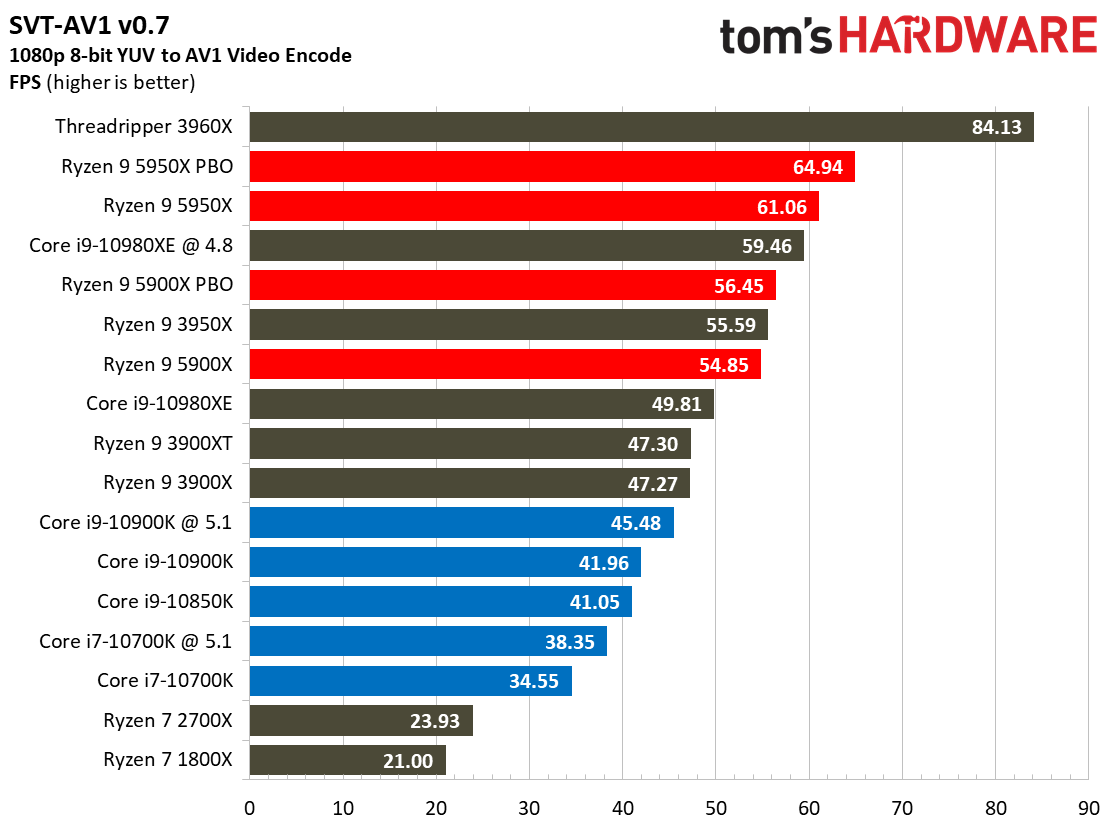
Our encoding tests include benchmarks that respond best to single-threaded performance, like the quintessential examples LAME and FLAC, but the SVT-AV1 and SVT-HEVC tests represent a newer class of threaded encoders. Regardless of the type of encoder, though, AMD's Zen 3 chips impress.
Web Browsing on Ryzen 9 5950X and Ryzen 9 5900X
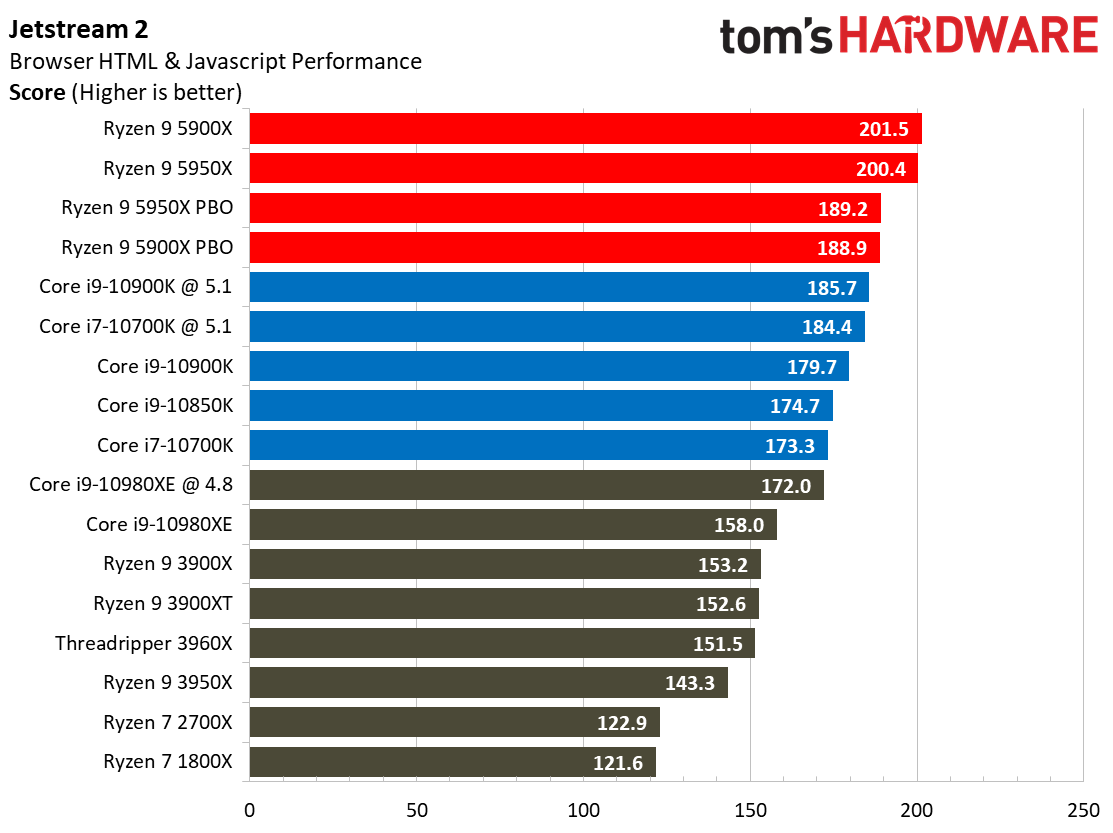
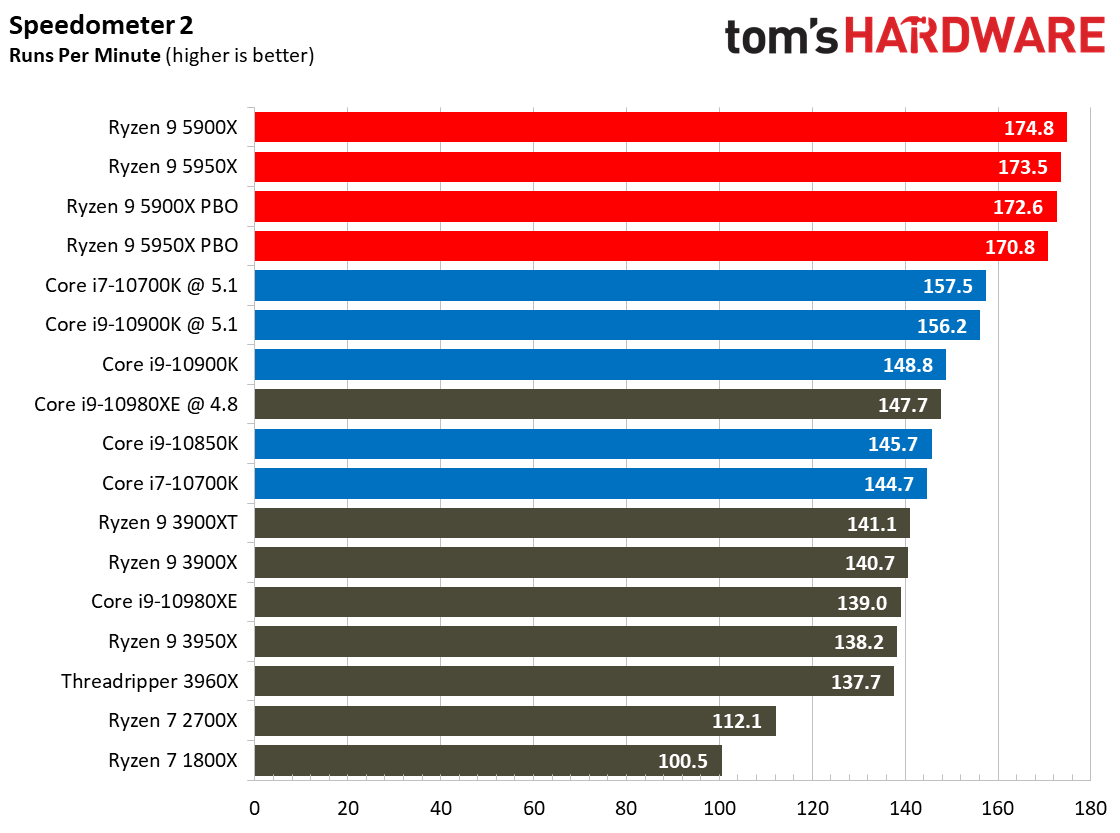
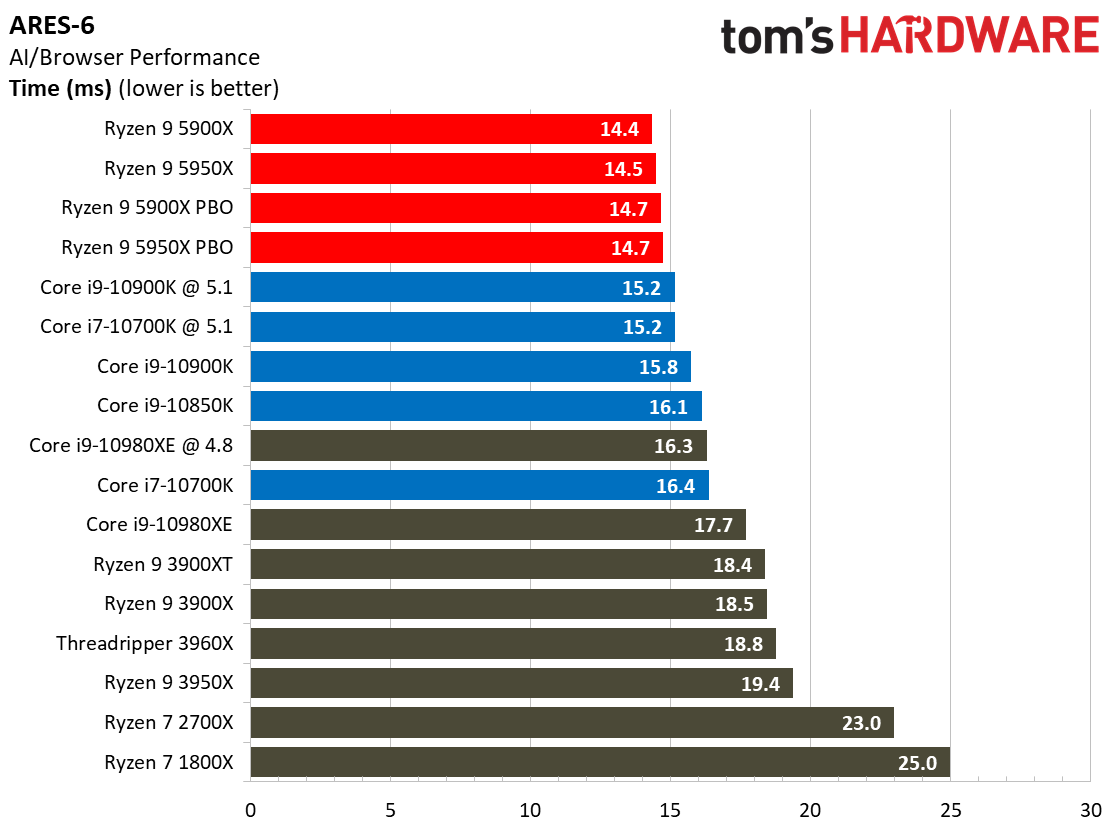
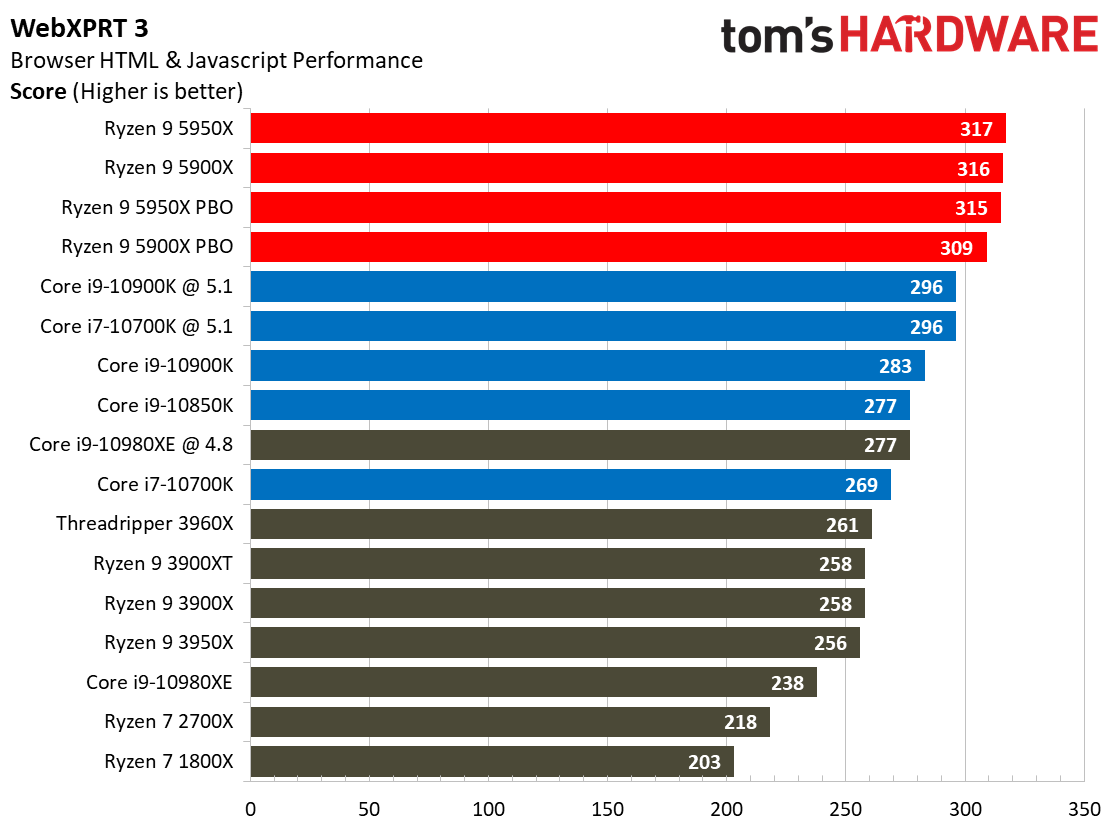
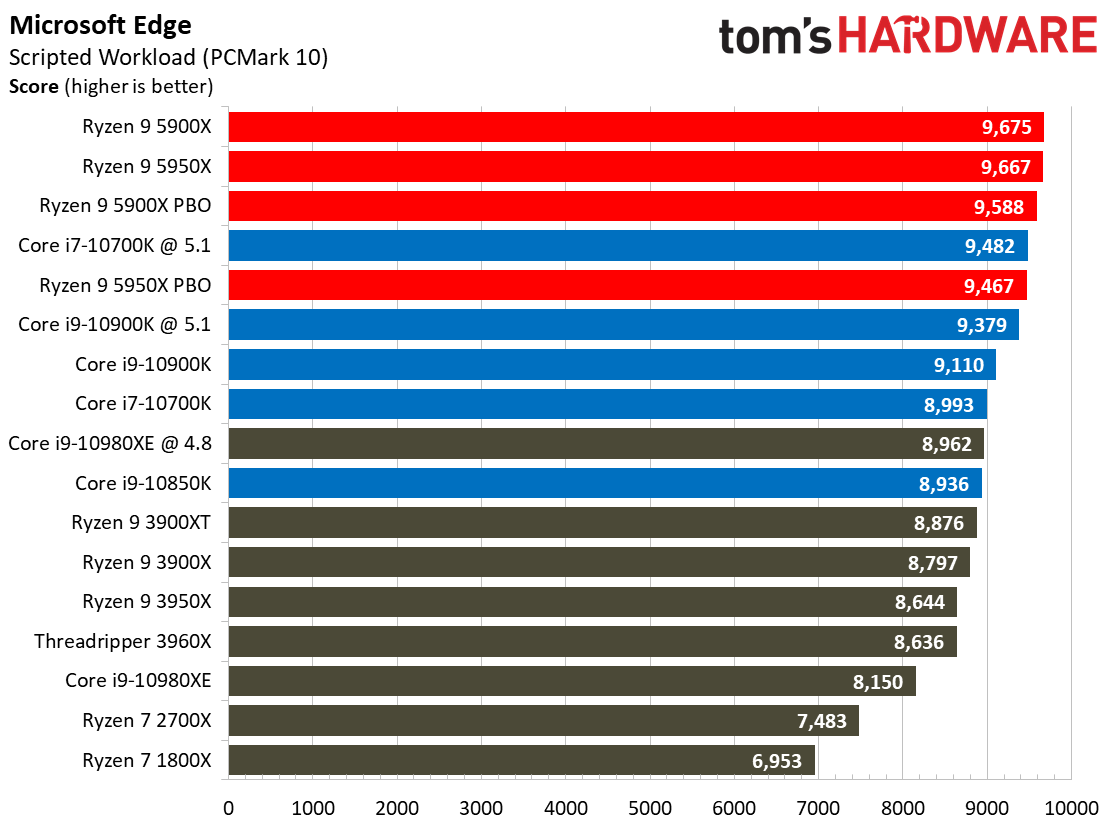
A glance at the bottom of these charts is like a trip down memory lane — that's the traditional position for AMD's chips in web browser benchmarks. These benchmarks are almost exclusively lightly-threaded, so Intel has long held the top of the charts. This series of benchmarks makes a powerful statement about Zen 3's improved single-threaded performance.
Get Tom's Hardware's best news and in-depth reviews, straight to your inbox.
Office and Productivity on Ryzen 9 5950X and Ryzen 9 5900X
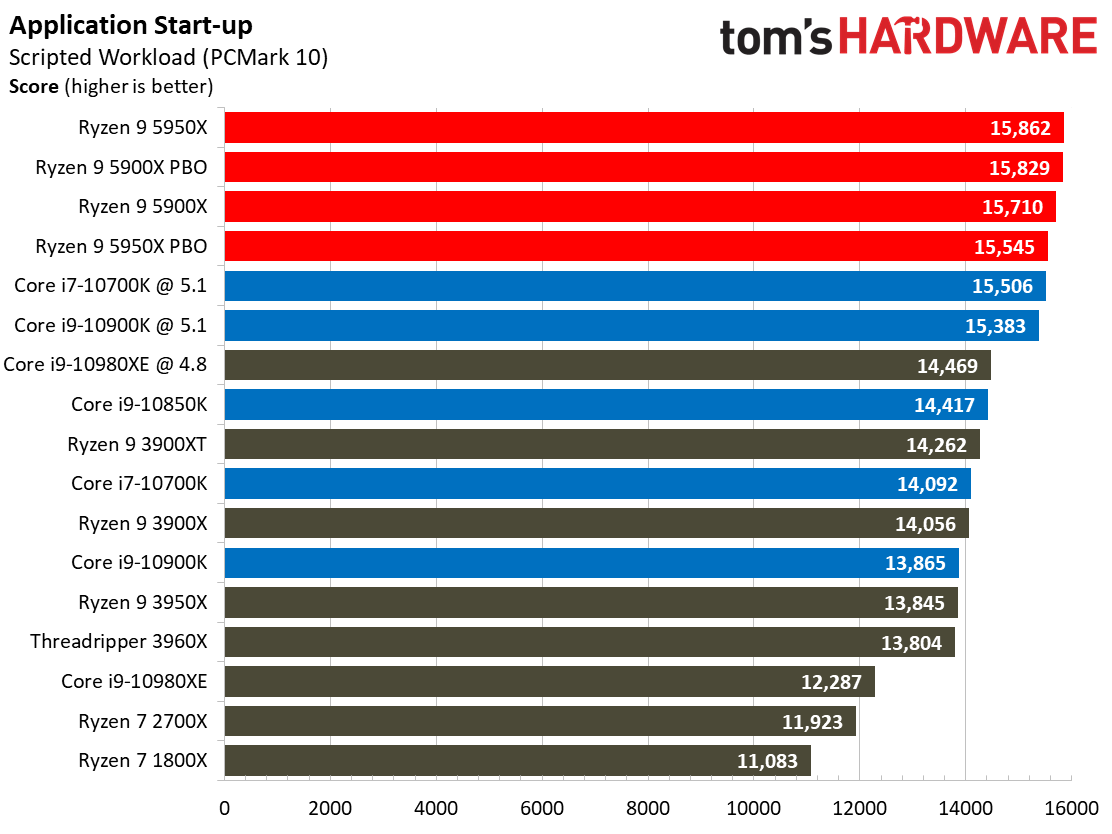
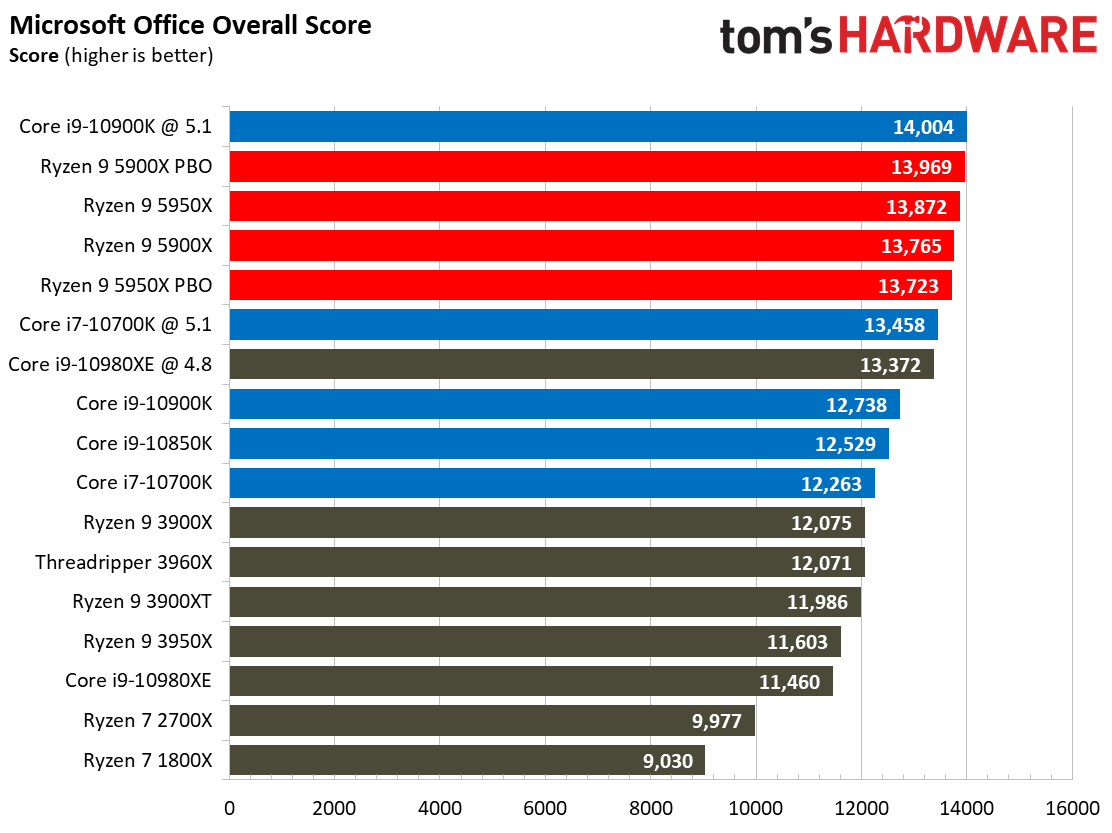
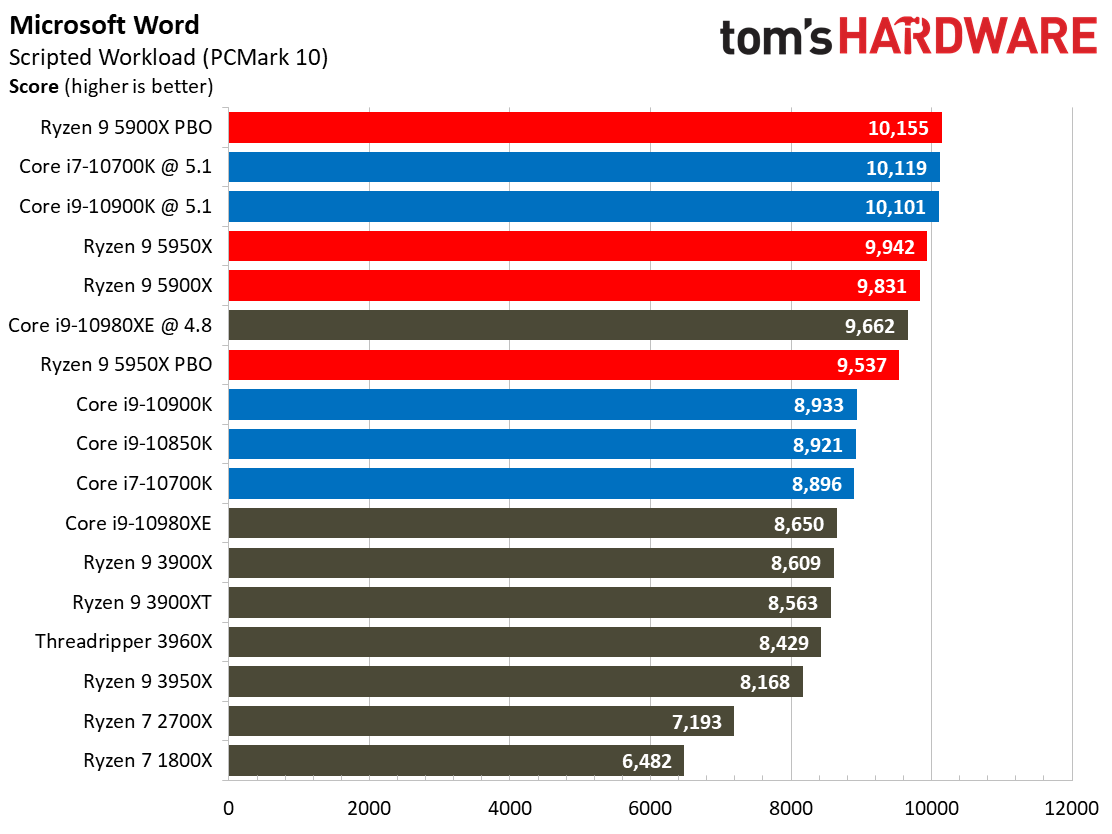
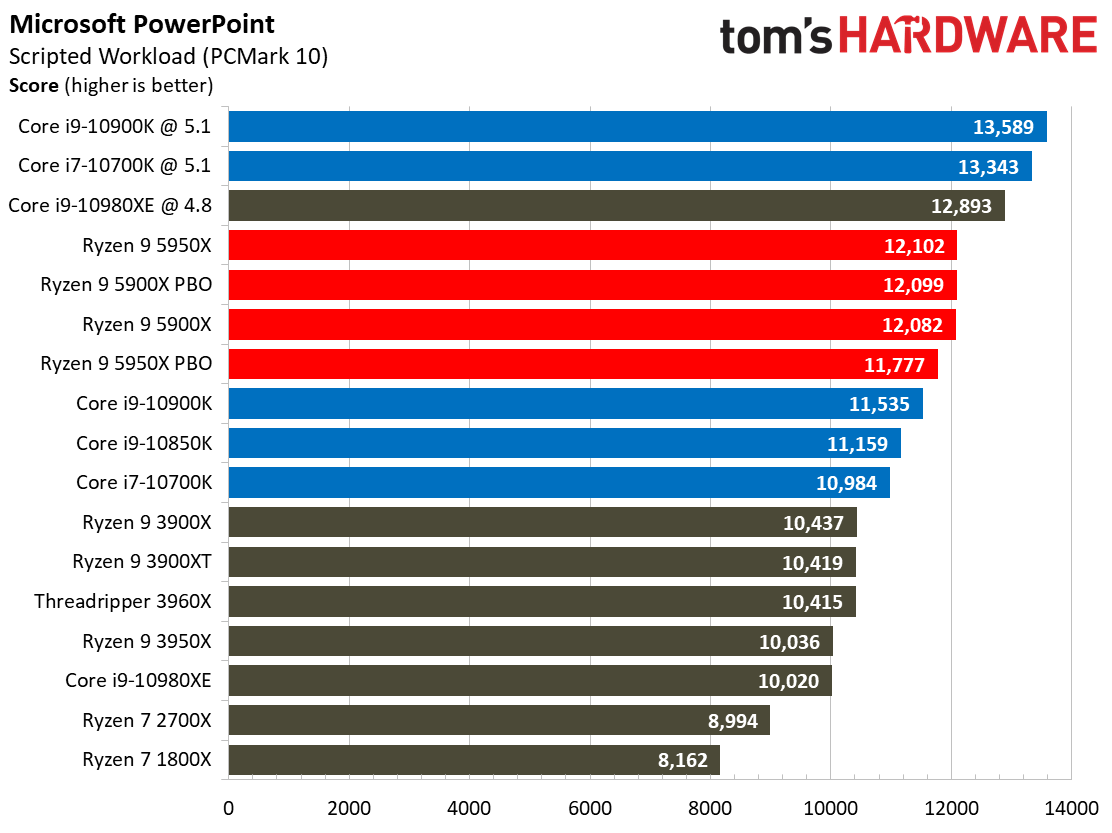

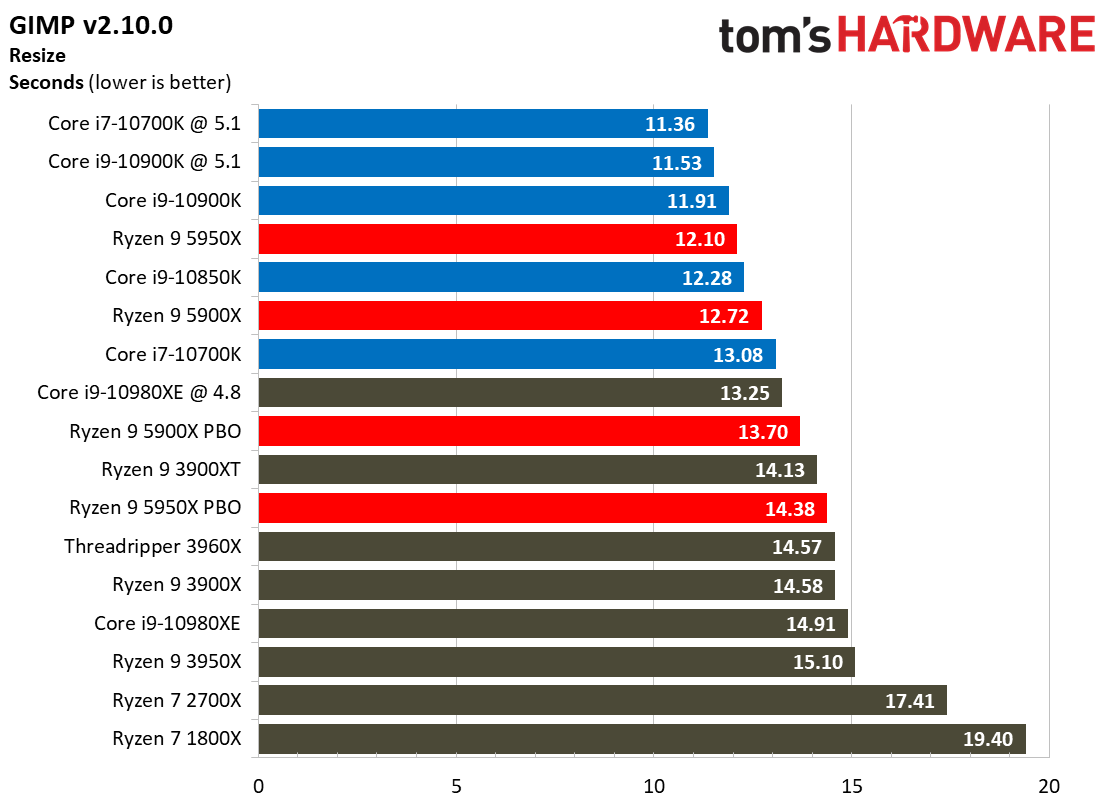
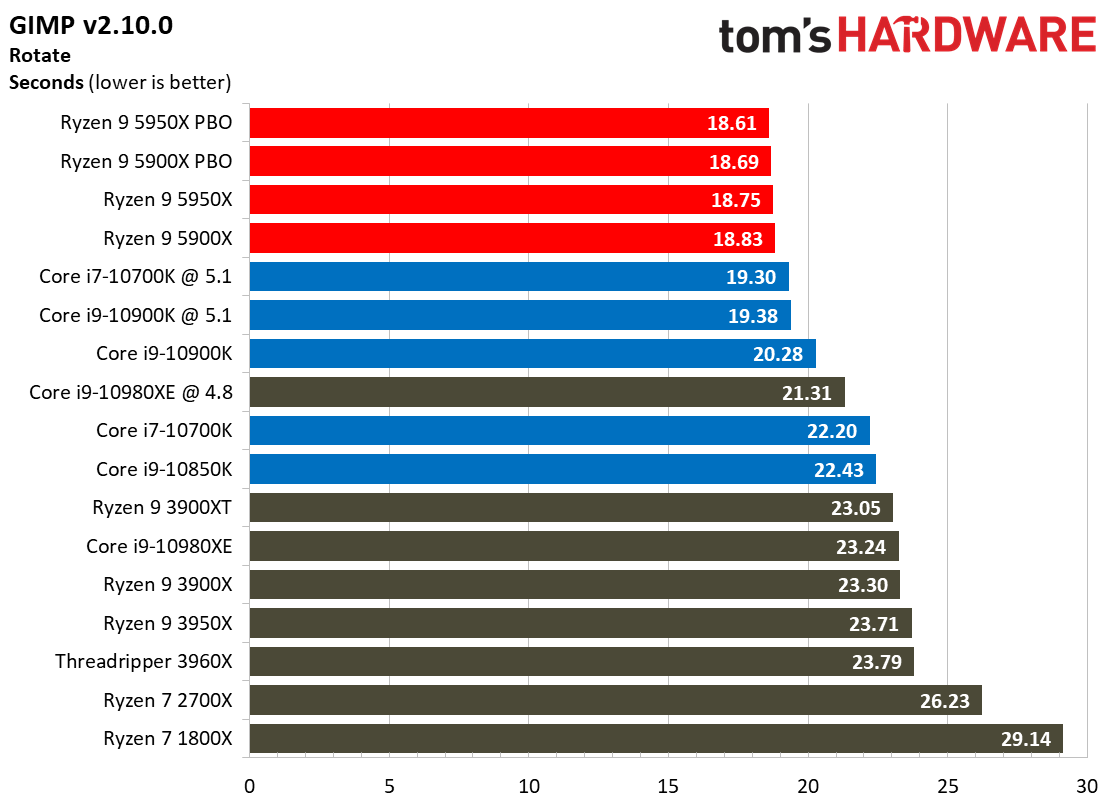
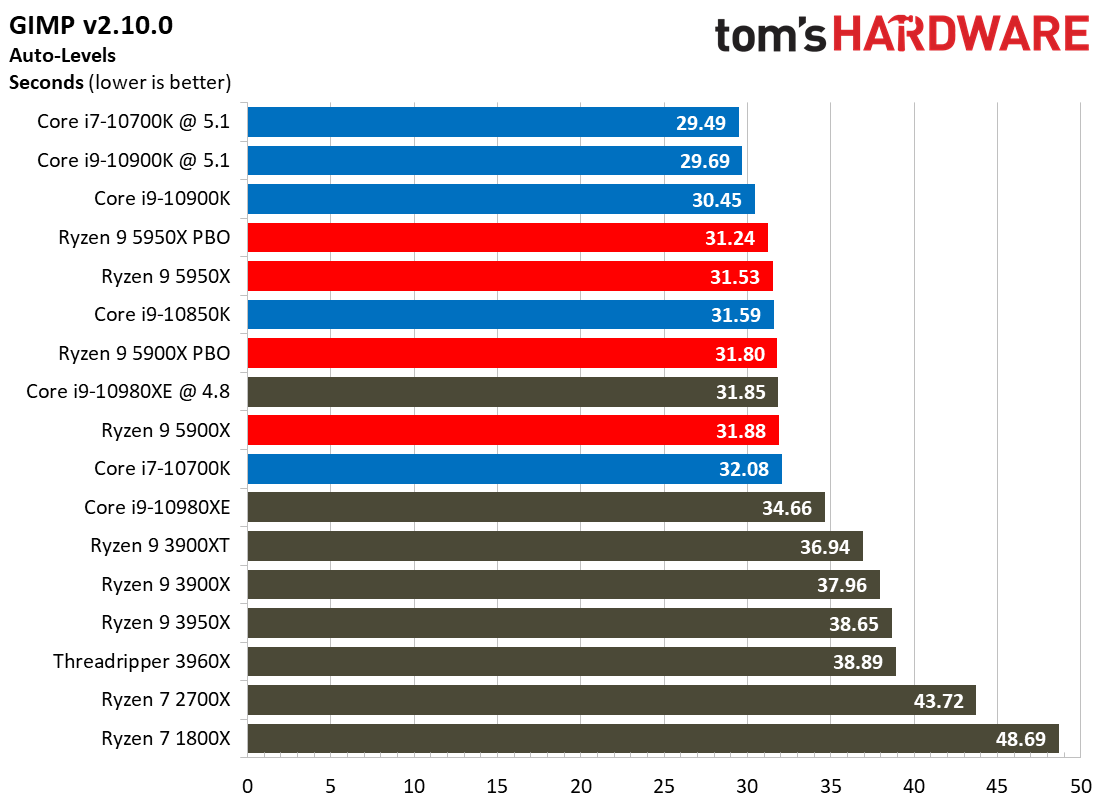
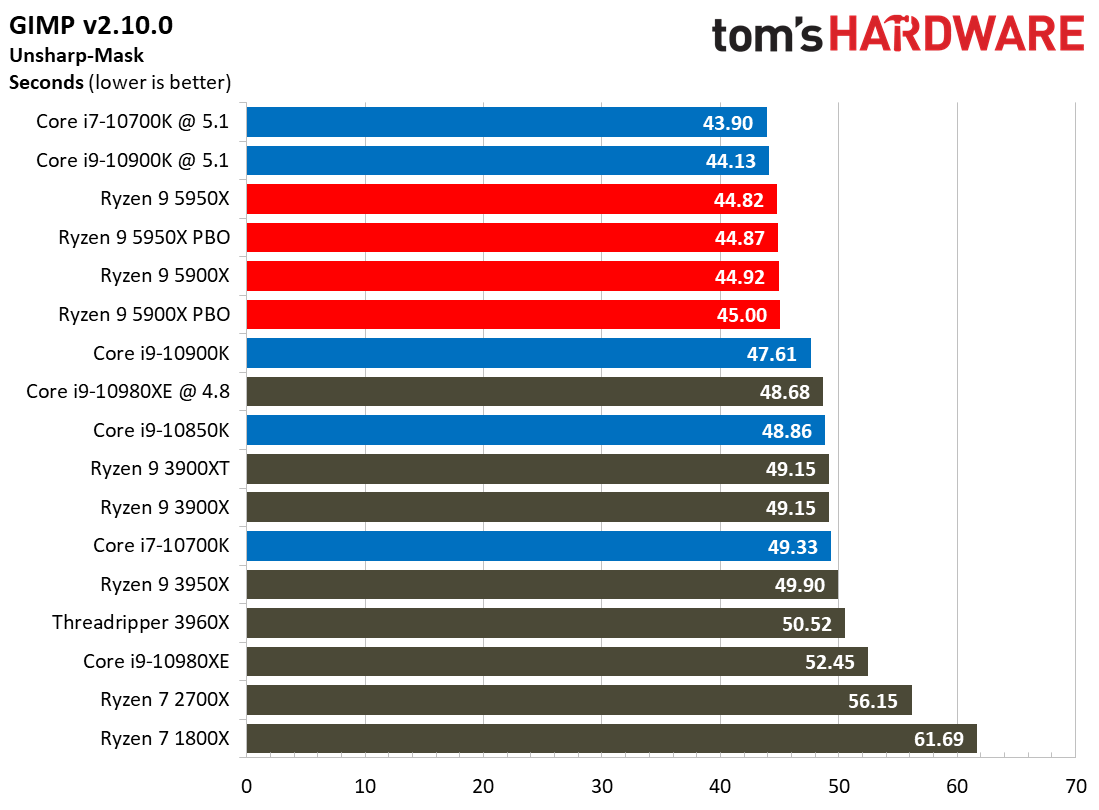
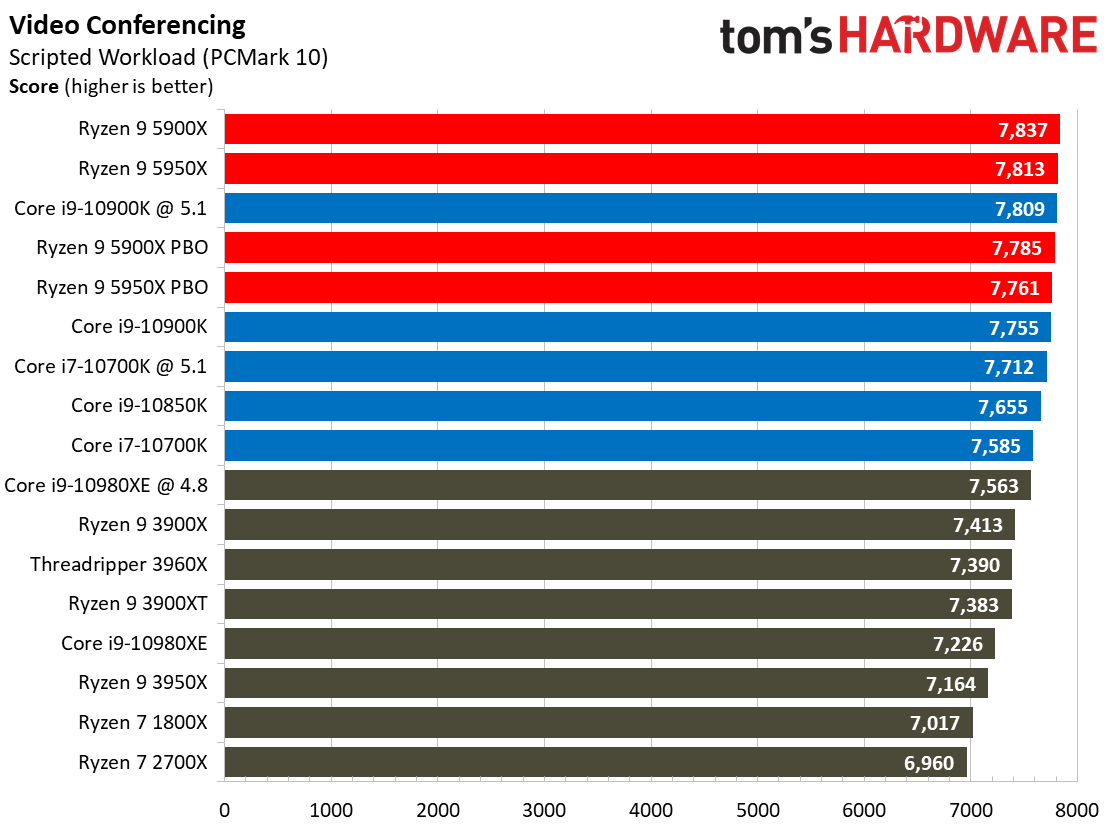
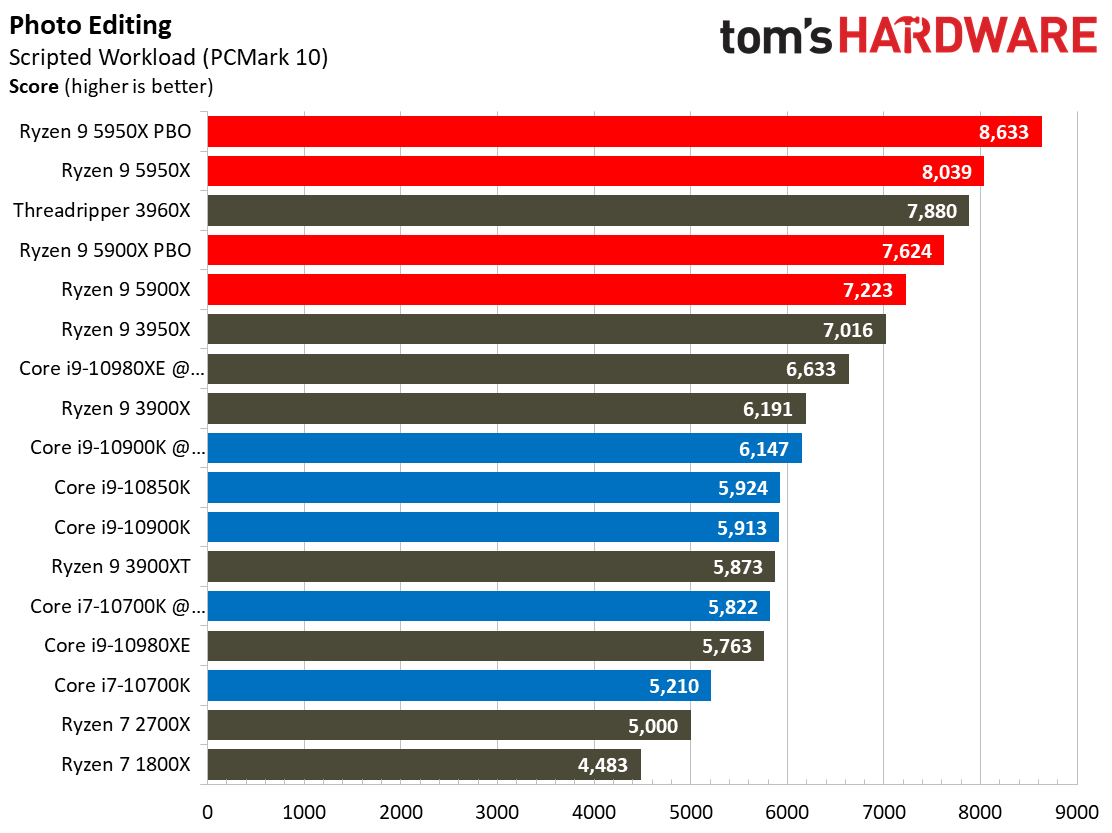
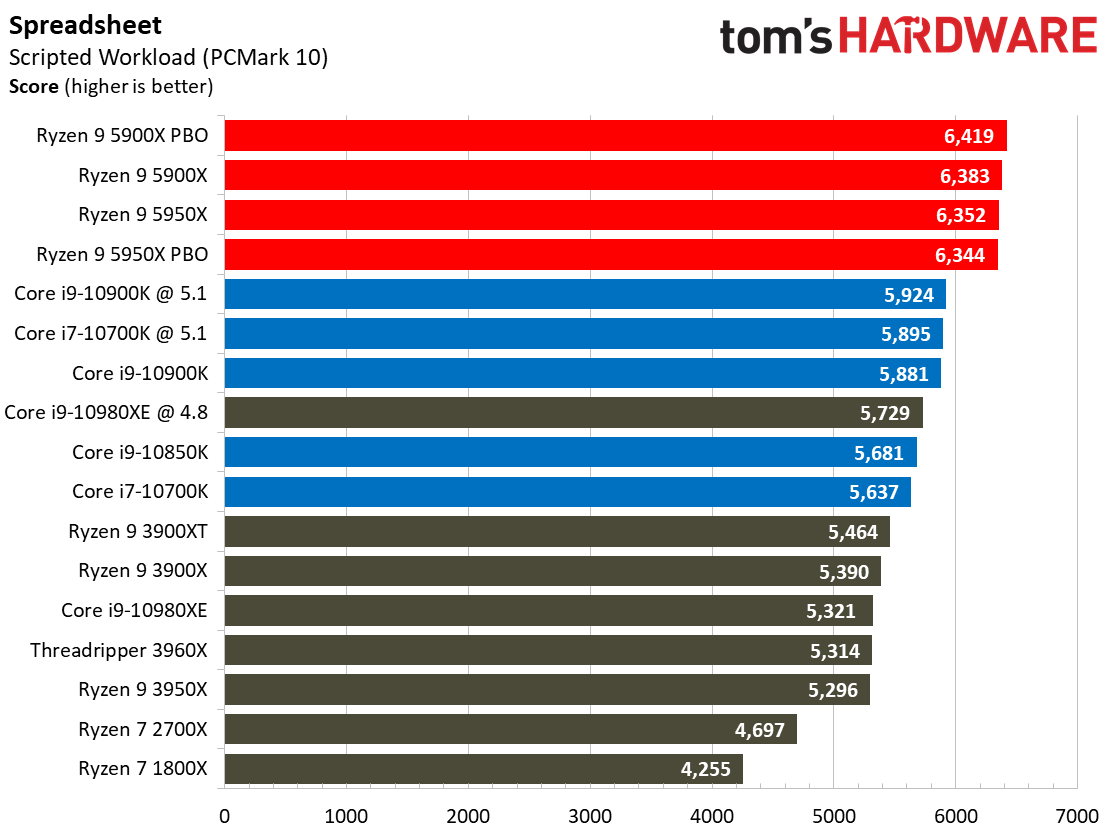
If you're looking to build a screaming-fast computer, you're probably not doing it to run office applications like Word at breakneck speeds. However, these types of applications are ubiquitous the world over, so snappy performance is important for daily tasks. This is another area that AMD has long offered middling performance, but Zen 3 climbs the ranks in impressive fashion.
Compilation, Compression, AVX Performance on Ryzen 9 5950X and Ryzen 9 5900X
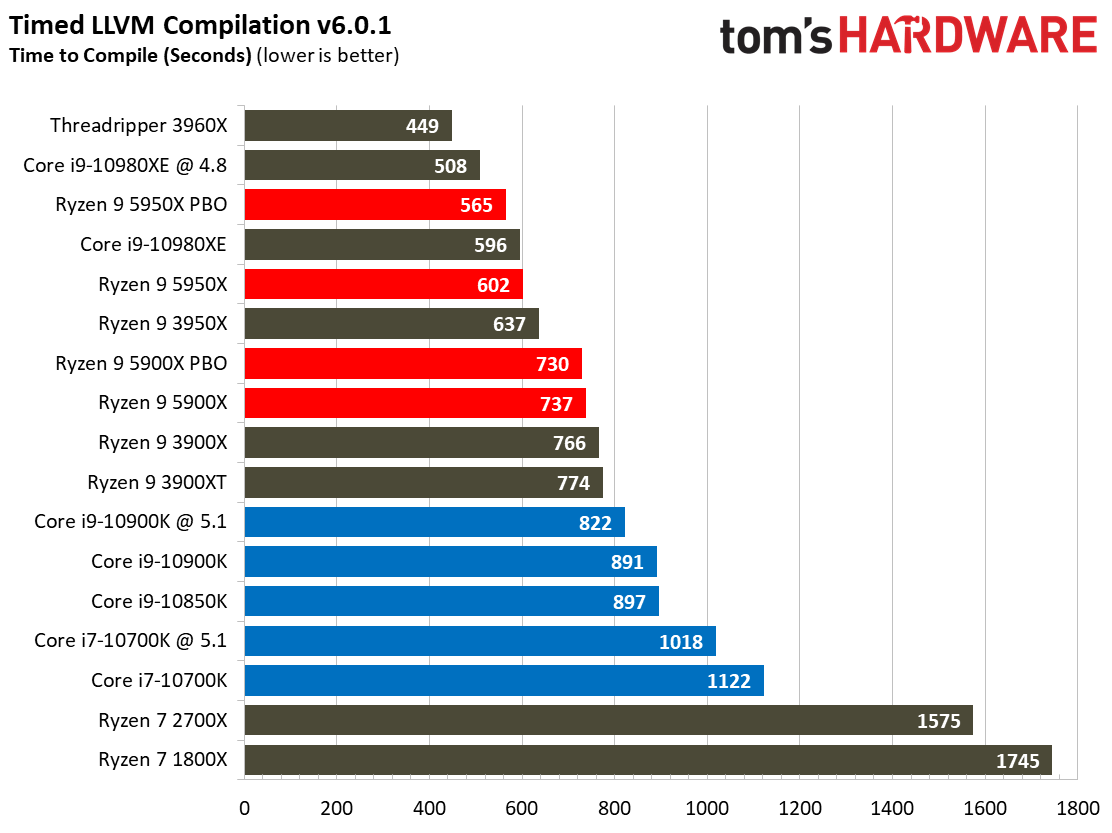
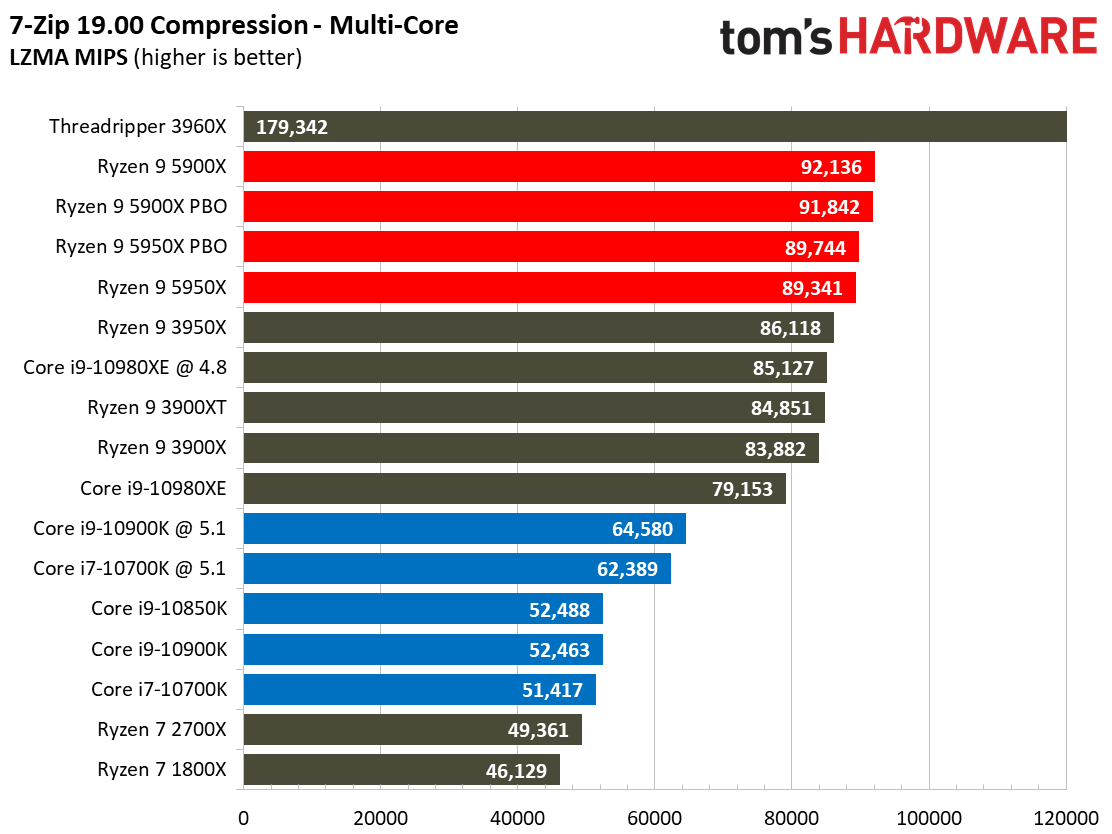
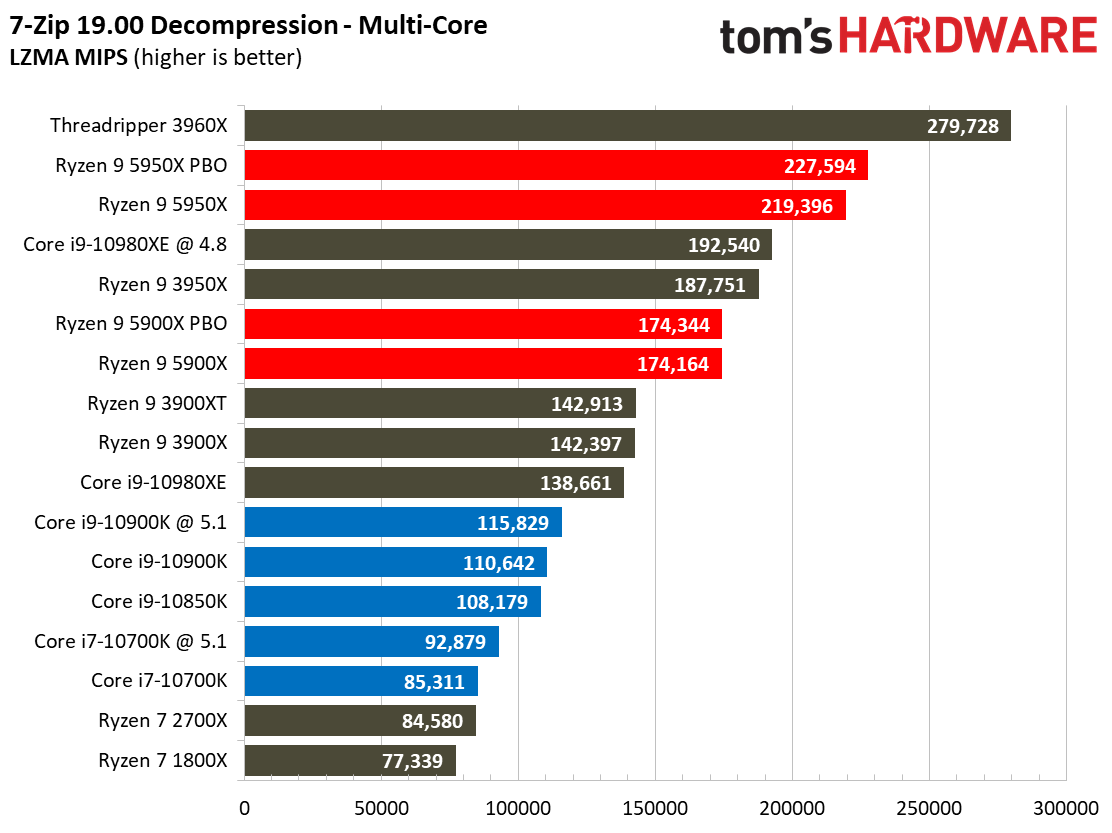
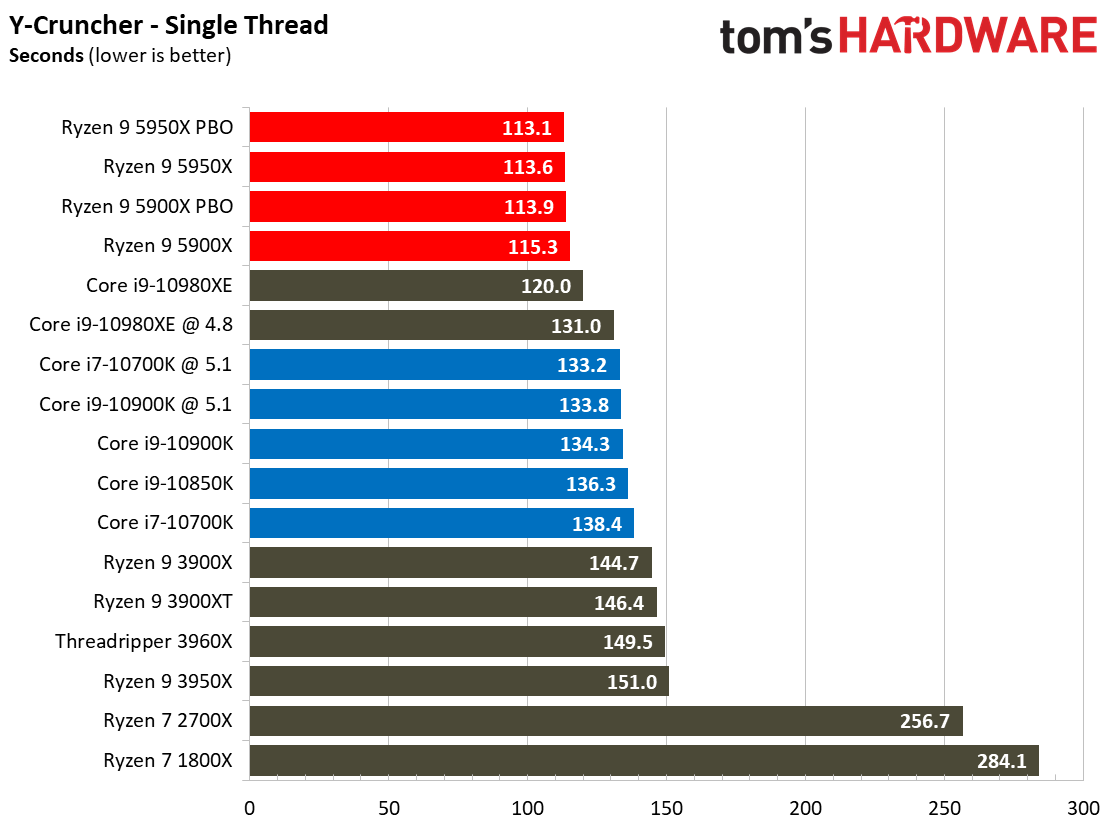
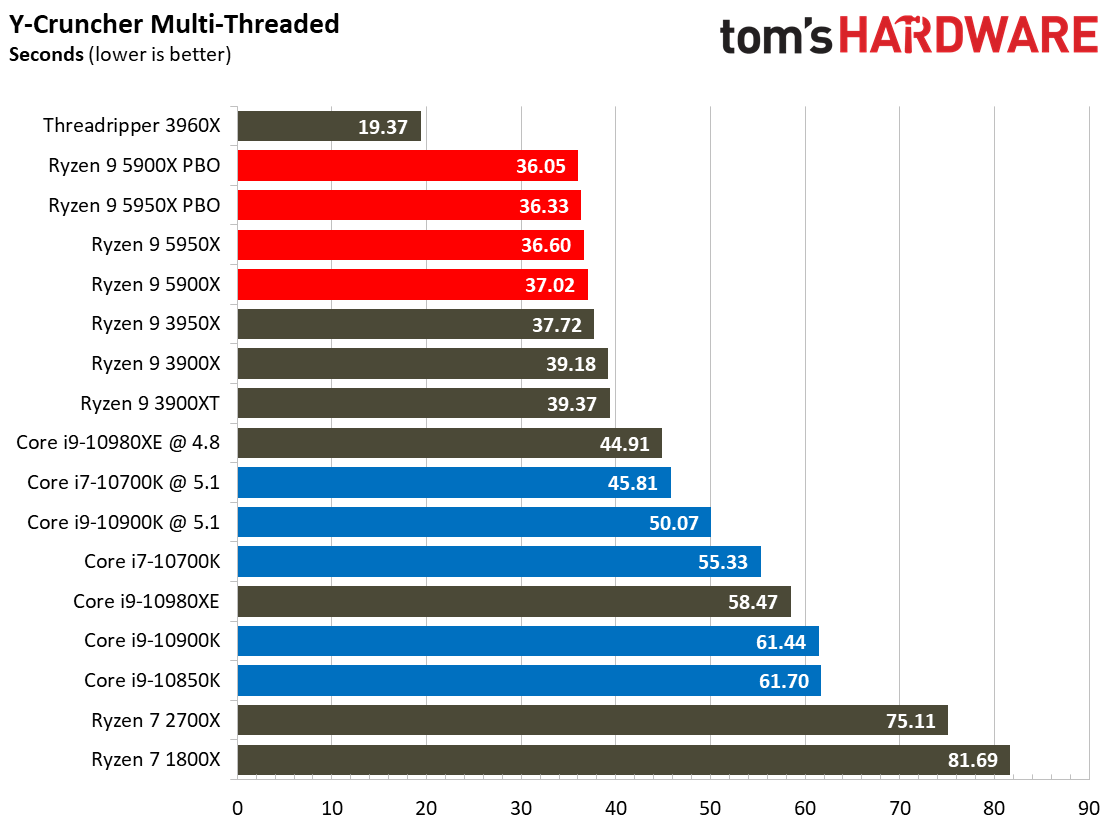
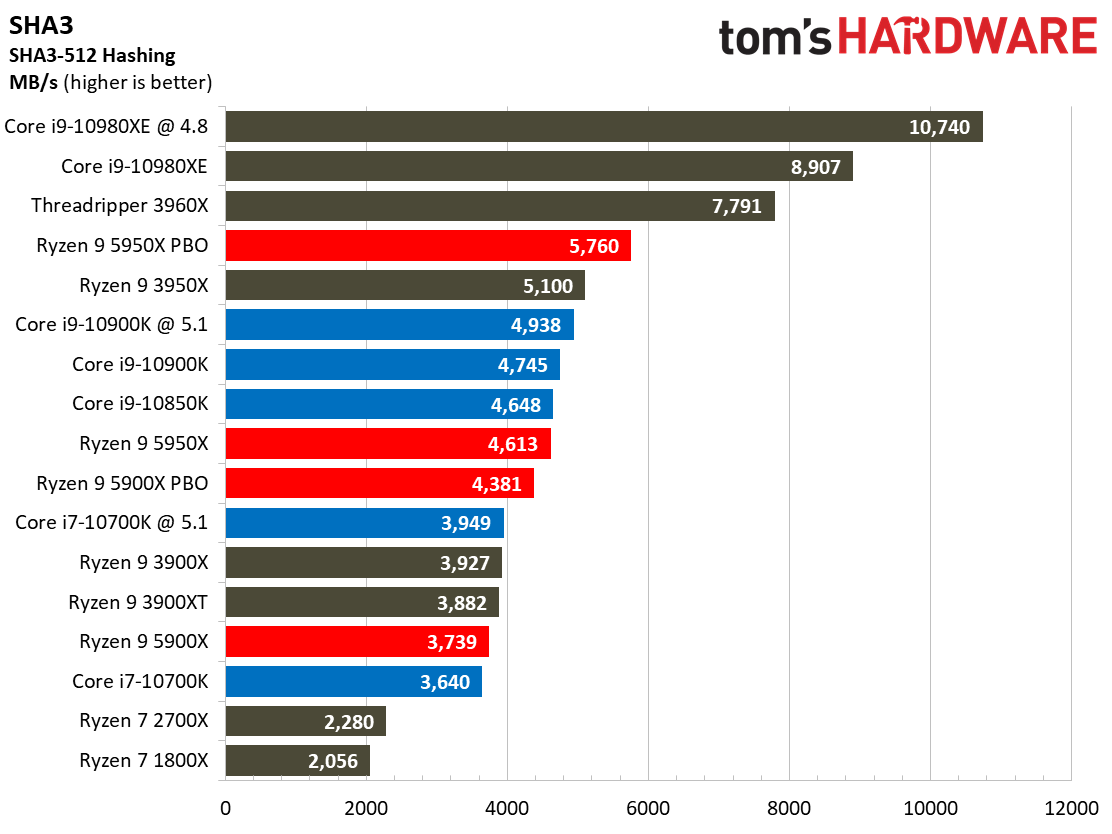
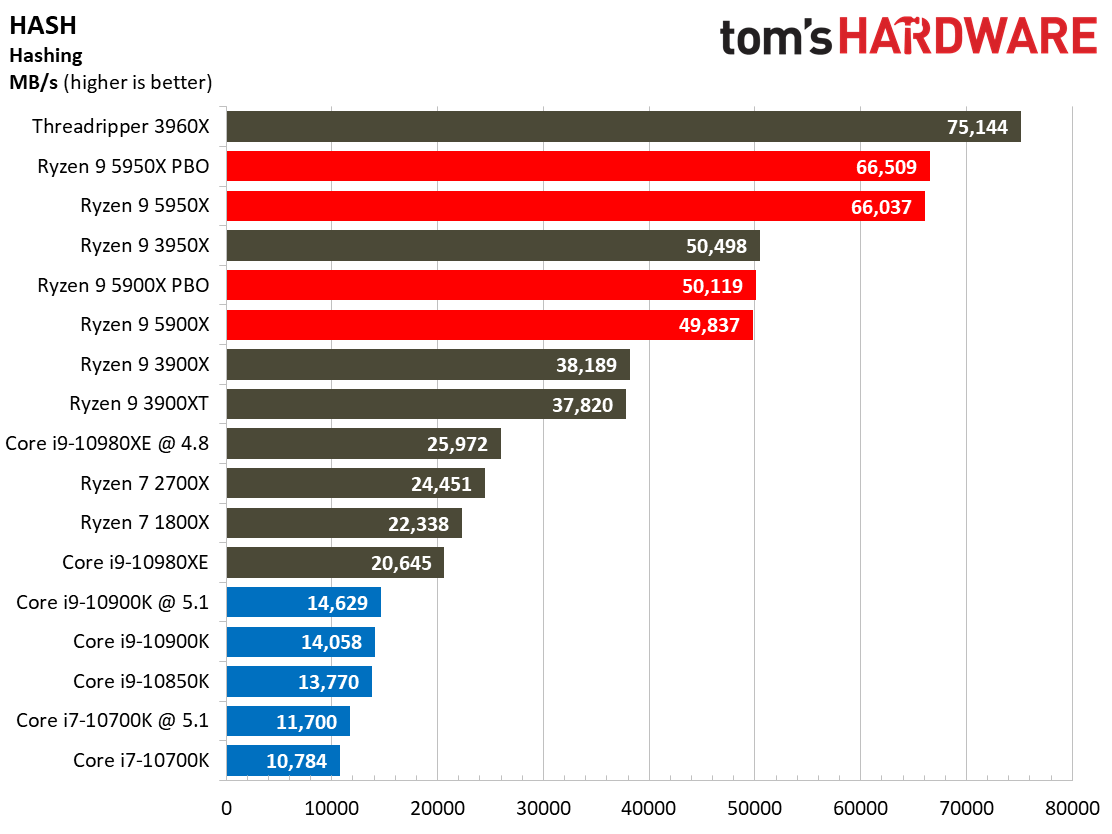
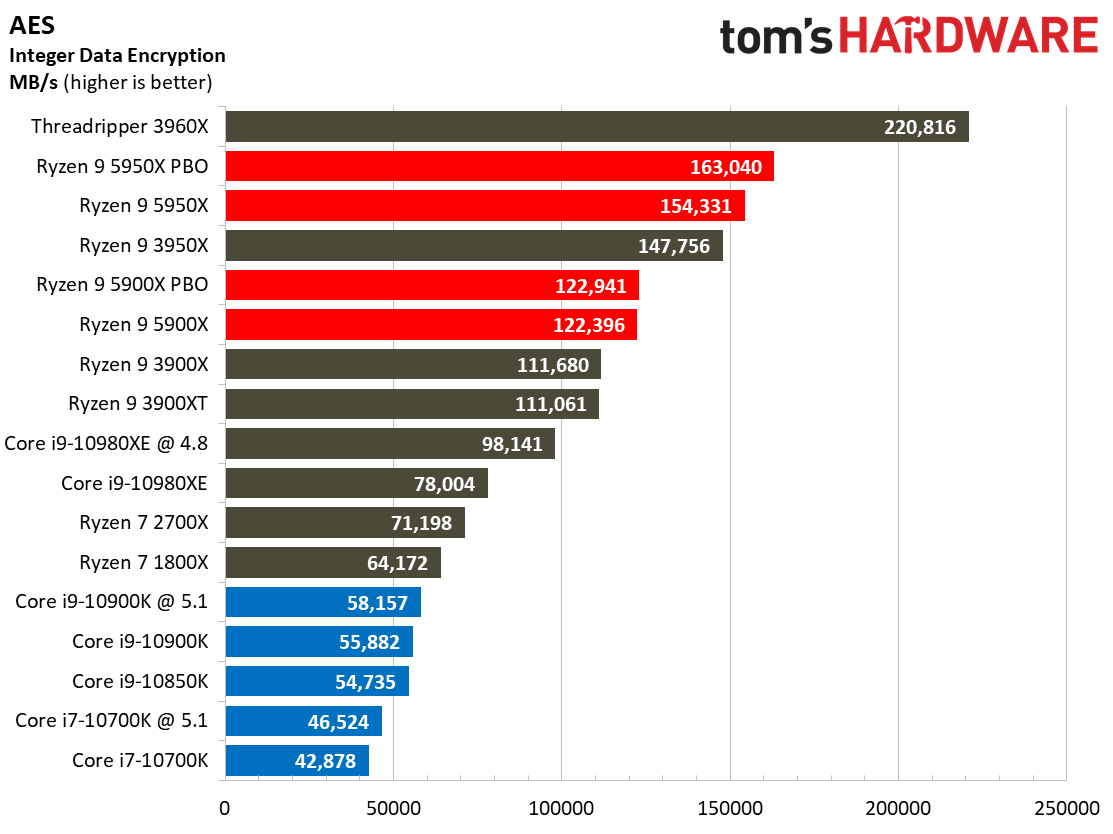
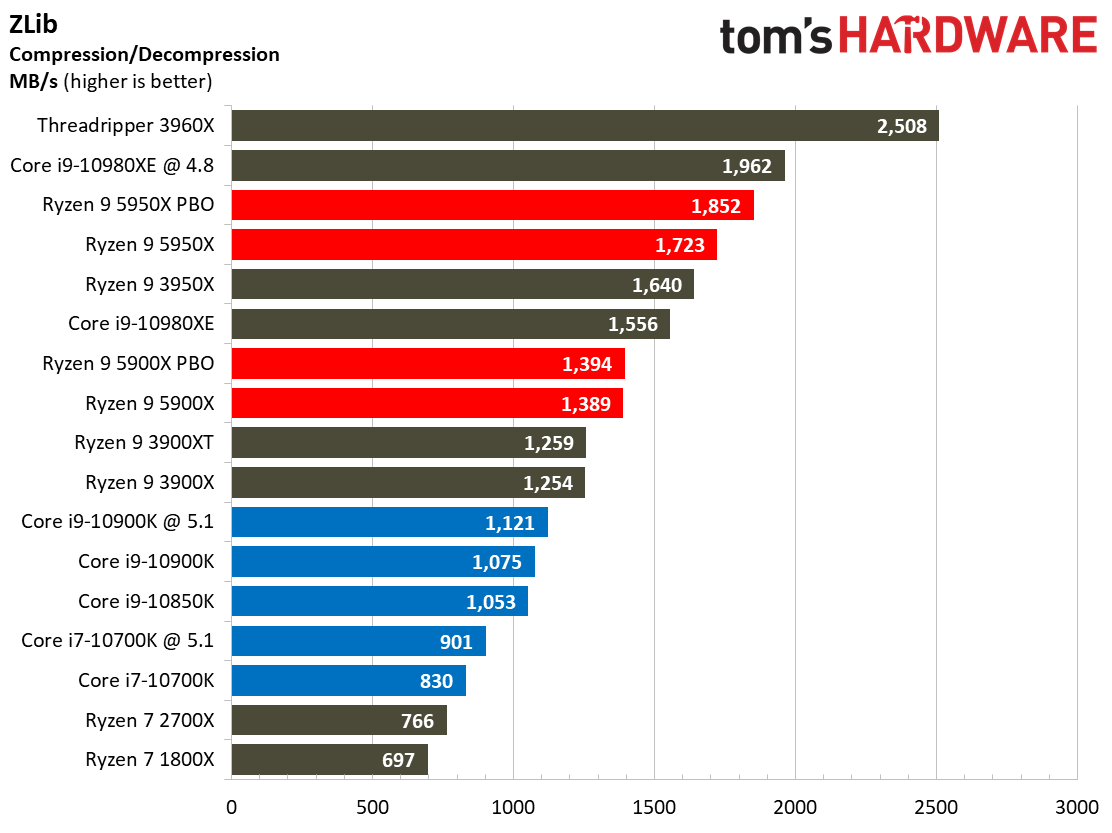
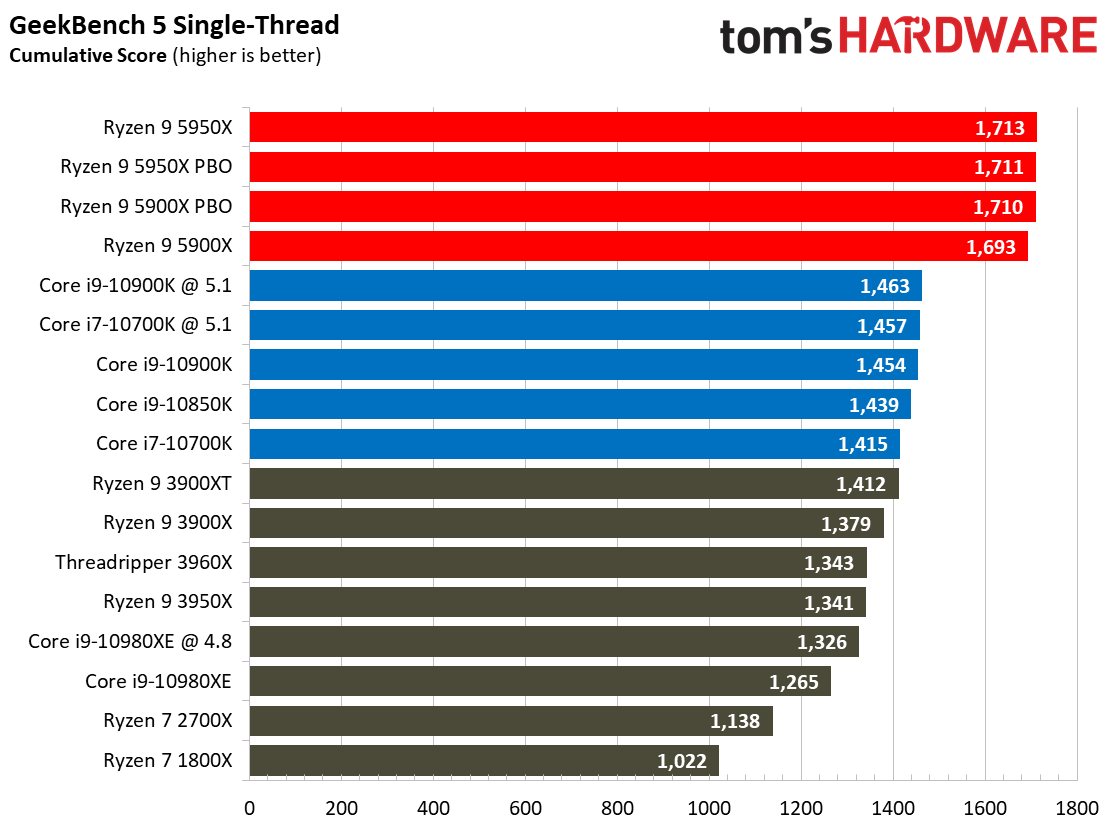
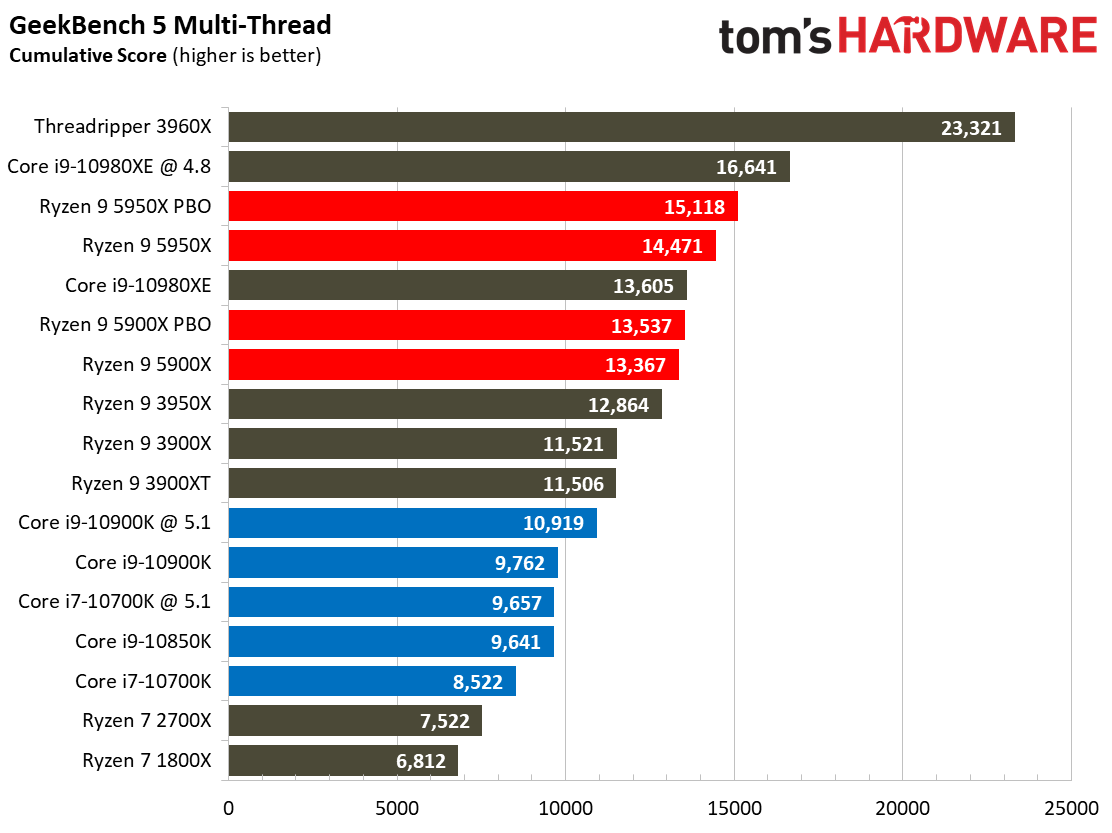
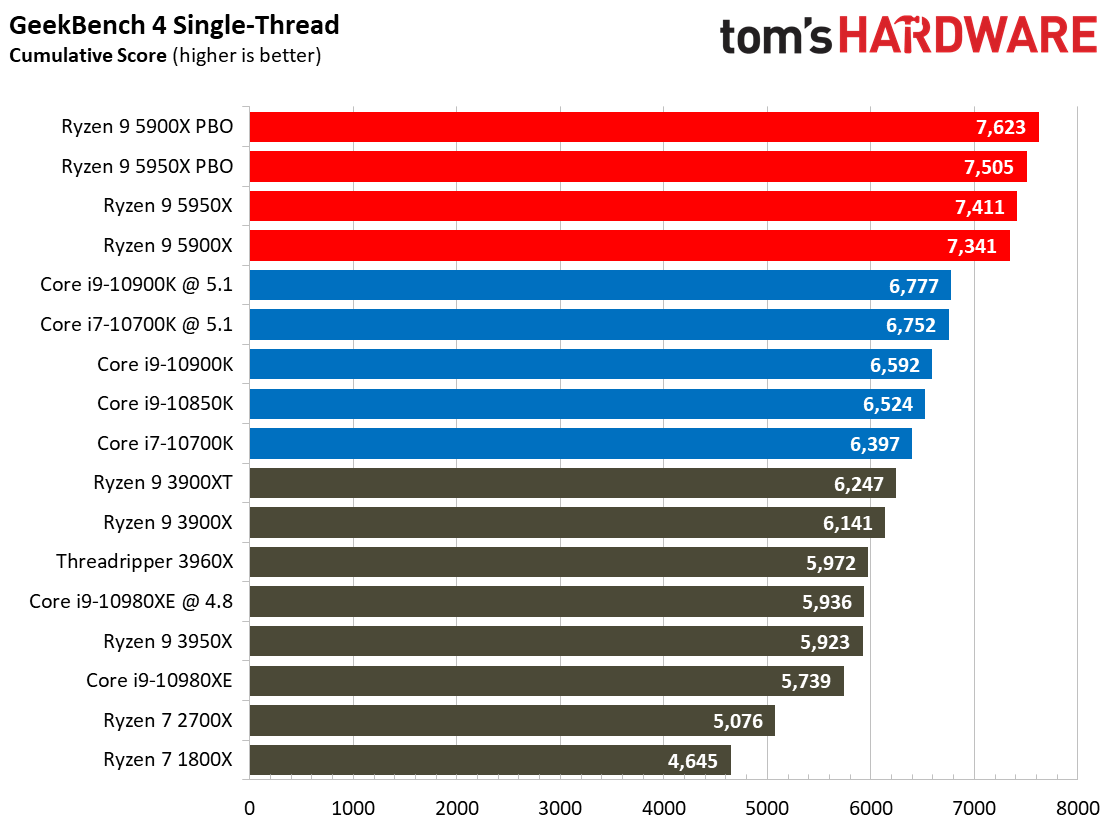
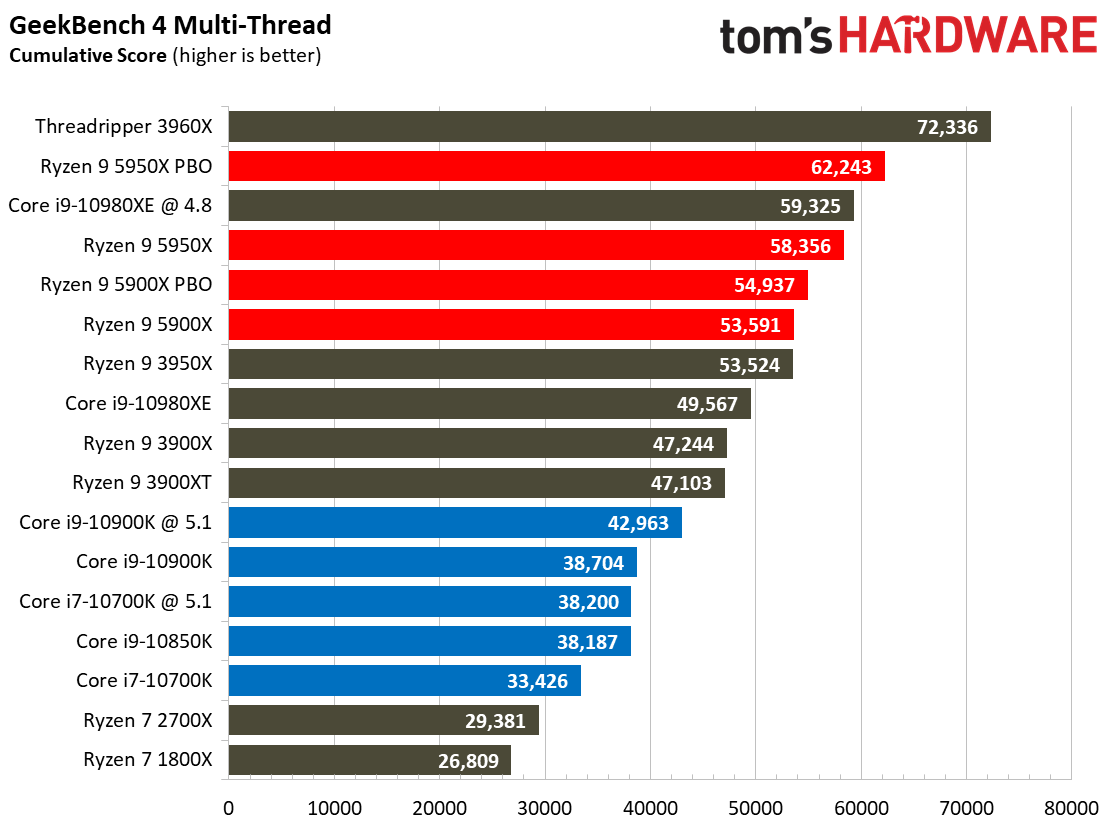
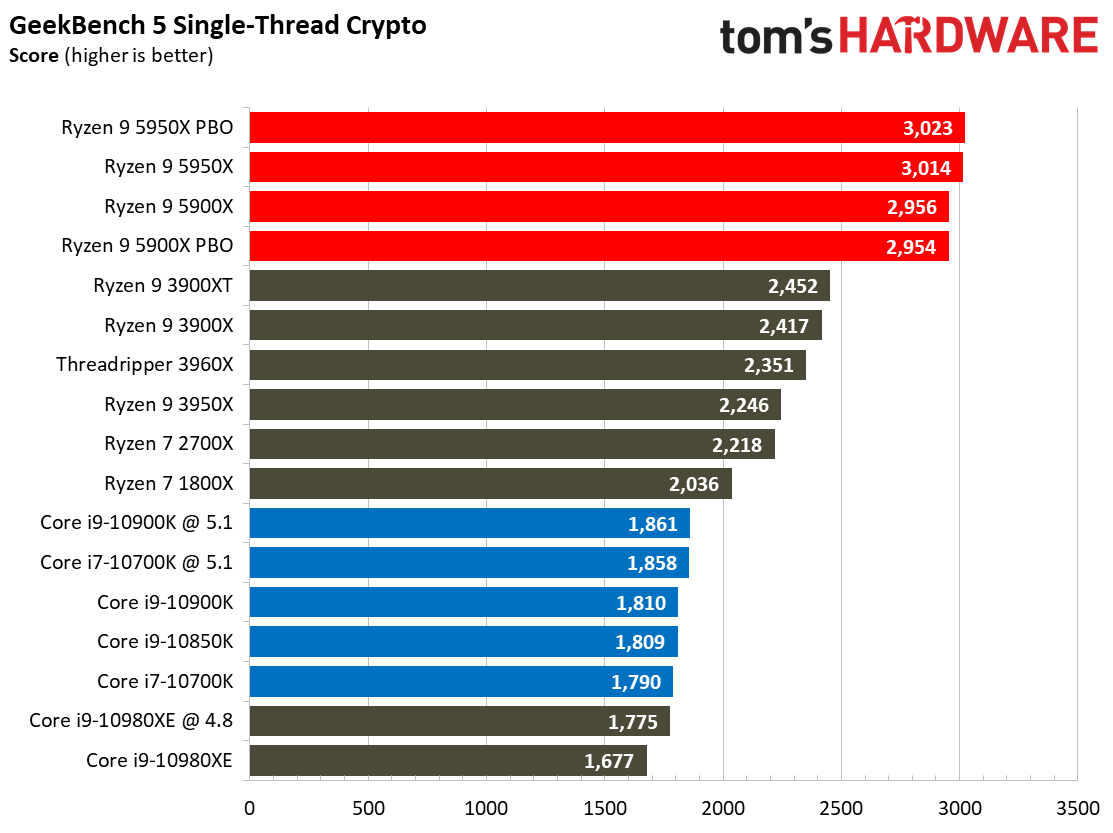
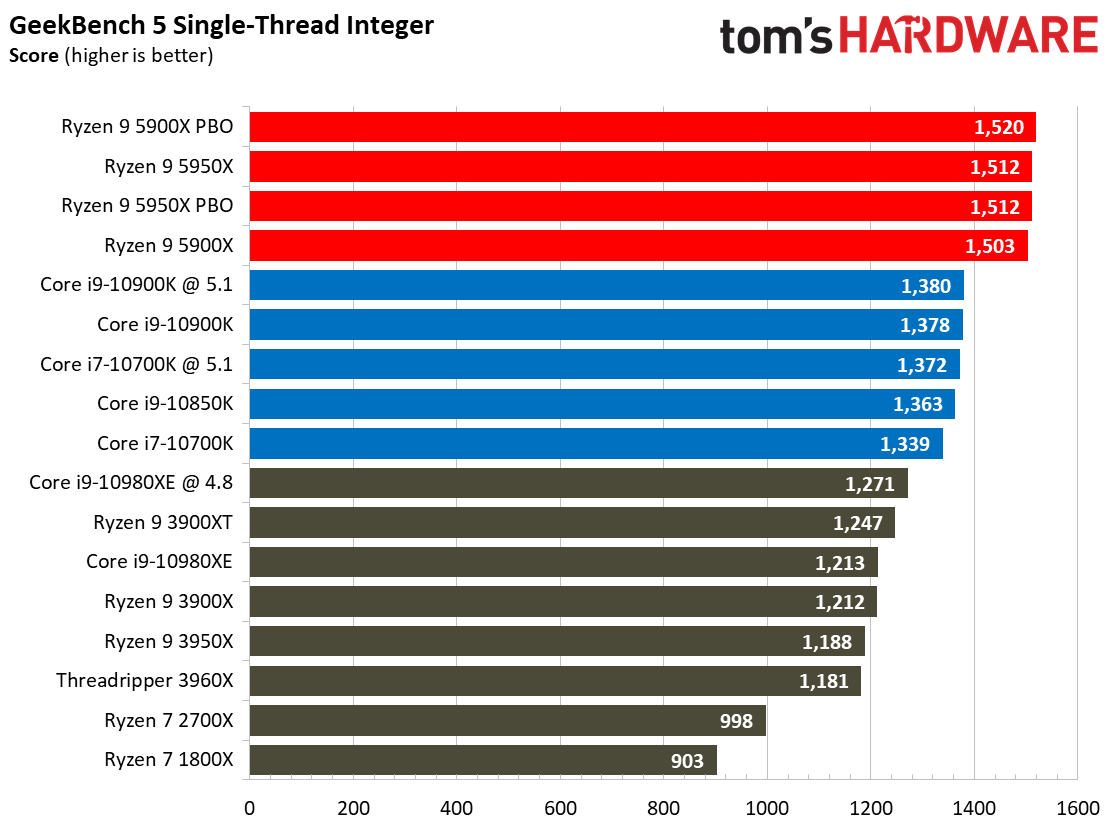
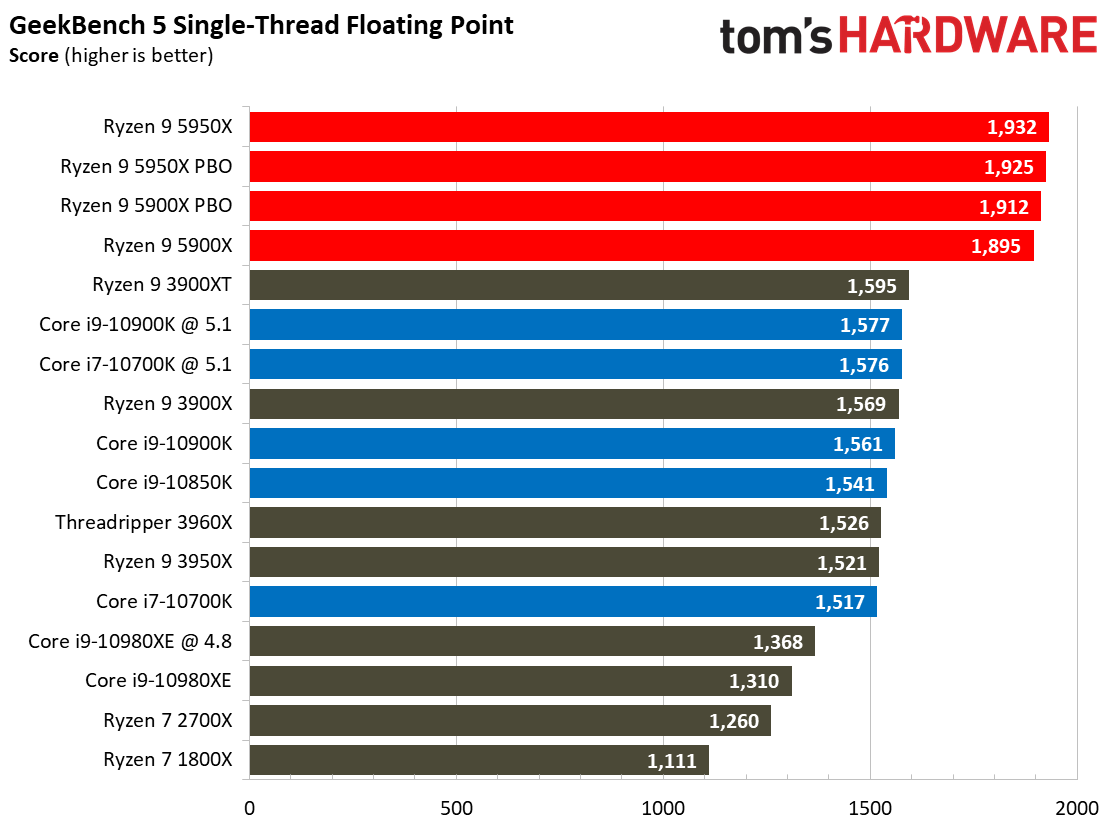
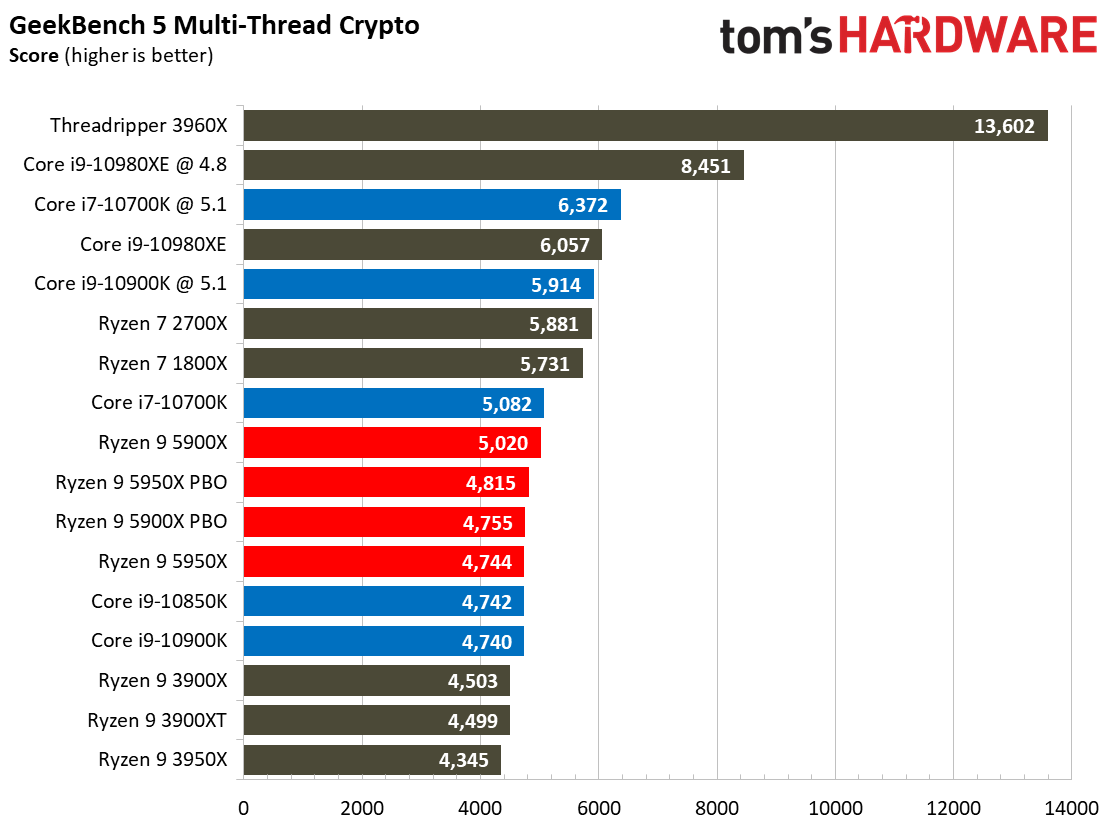
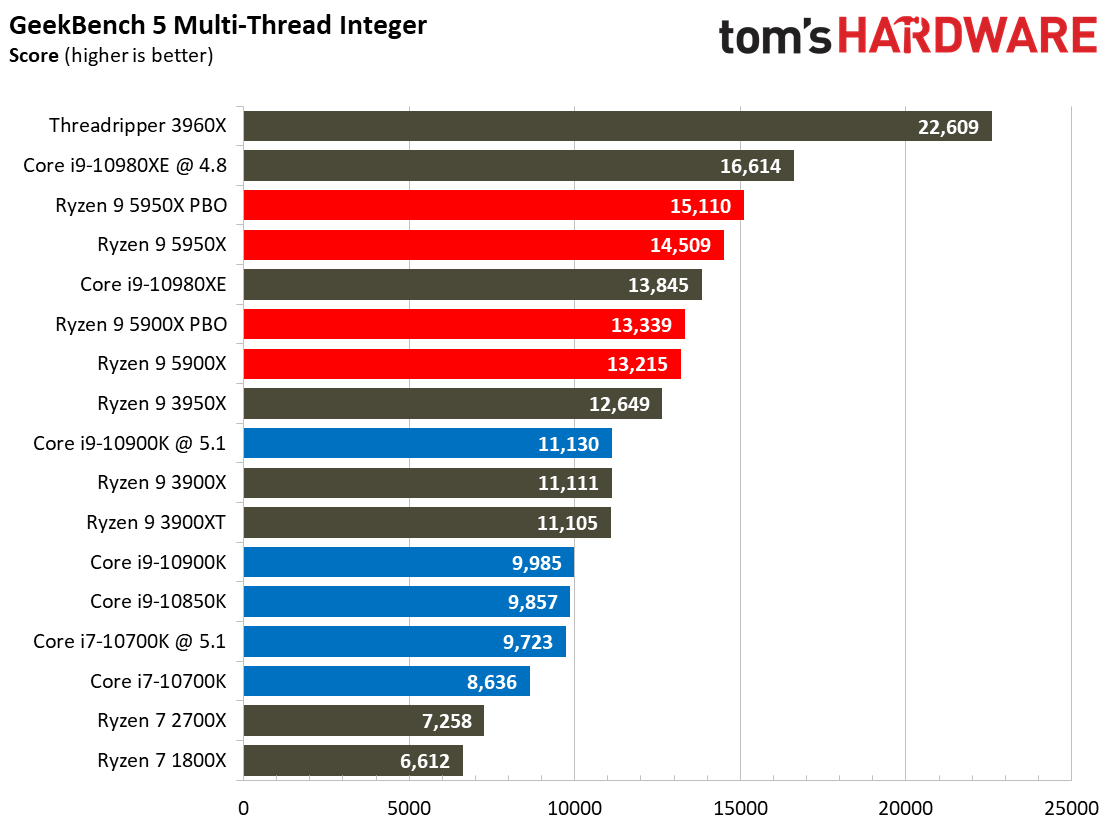
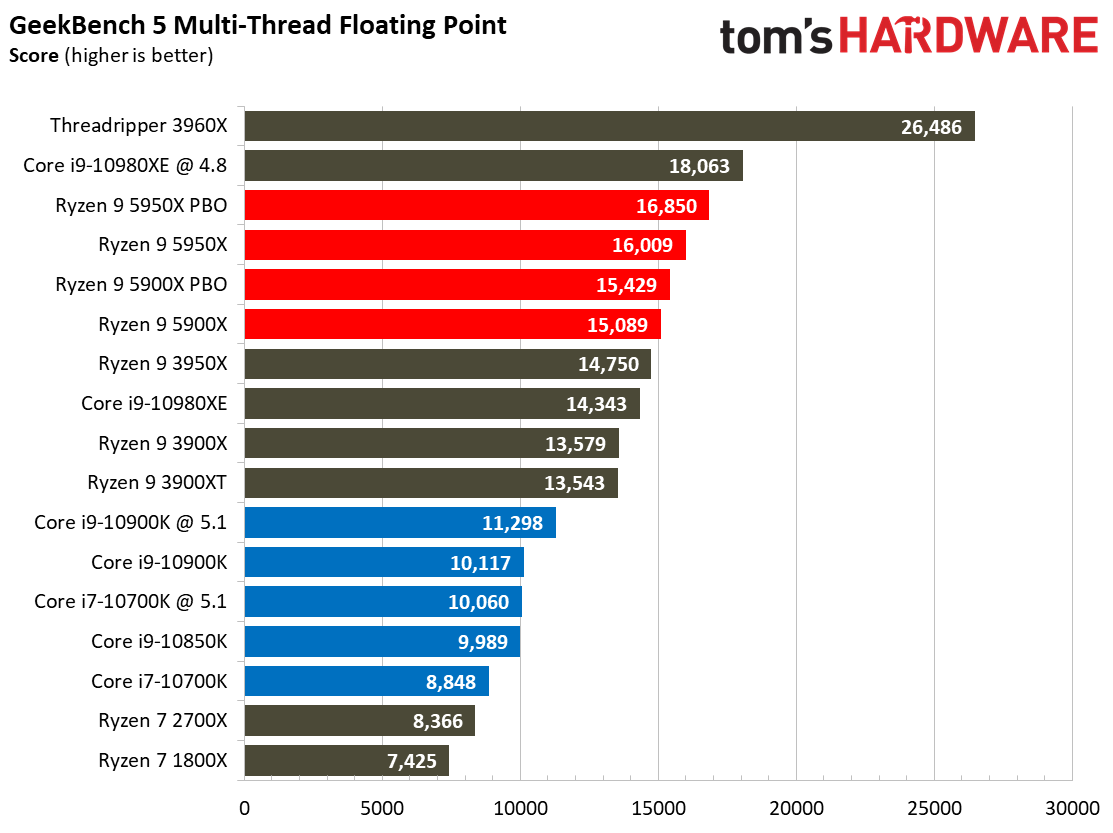
The LLVM compilation benchmark stresses the cores heavily, and here we see that the Ryzen 9 5950X doesn't offer much uplift over the previous-gen Ryzen 9 3950X. The same can be said about the Ryzen 9 5900X compared to its previous-gen counterpart, the Ryzen 9 3900X/T. These muted gains imply that the bottleneck lies elsewhere.
The threaded y-cruncher benchmark again shows limited scaling for the 5950X over the 3950X, and given the memory-heavy nature of this workload, we theorize this boils down to the same limitation on both chips — a dual-channel memory controller that restricts feeding the 16 hungry cores.
MORE: Best CPUs
MORE: Intel and AMD CPU Benchmarks
MORE: All CPUs Content
Current page: AMD Ryzen 9 5950X and Ryzen 9 5900X Desktop PC Application Benchmarks
Prev Page AMD Ryzen 9 5950X and Ryzen 9 5900X Gaming Benchmarks Next Page AMD Ryzen 9 5950X and Ryzen 9 5900X Adobe, SPECworkstation 3, SPECviewperf 2020 Benchmarks
Paul Alcorn is the Editor-in-Chief for Tom's Hardware US. He also writes news and reviews on CPUs, storage, and enterprise hardware.
-
everettfsargent https://forums.tomshardware.com/threads/amd-ryzen-9-5950x-and-5900x-review-zen-3-breaks-the-5-ghz-barrier.3659689/Reply
Reposting a three week old review? -
everettfsargent Oh and Core i9-10980XE $815 (retail) "You can find the 18-core 36-thread Core i9-10980XE for $815 at several retailers ... " is still a bald-faced lie three weeks later! :(Reply -
VTXcnME Humorous the 'cons' that list price increases of $50. For the last decade, Intels flagship processor has been half again as much as the current Ryzen5000 and so few tech sites batted an eye about it. And it's been a bit since I shopped intel chips, but last I checked, Intel hasn't been bundling coolers with their chips for a while? Someone who follows intel might be able to provide me some guidance there.Reply
As a home building enthusiast (for the last decade or so) this is a very exciting time having legit competition between team red and team blue. Even AMD and Nvidia is getting interesting! A fantastic time to be a home builder. I can't wait to see how intel counter punches here. Should be an interesting decade ahead. -
veldrane2 mmmmkay ........Reply
But can it break the "be actually in stock" barrier ?
Which benchmark tools give us those results ?
I mean ... It does look cute somewhere in the fluffy land of benchmarks and future upcoming products even though "technically" its not a future product. -
JordonB Reply
AMD 5950 selling at $695 on Amazon. It was there last night for sale 1 per person. I was happily surprised. I would have purchased it but had purchased a 3900X 4 months ago.veldrane2 said:mmmmkay ........
But can it break the "be actually in stock" barrier ?
Which benchmark tools give us those results ?
I mean ... It does look cute somewhere in the fluffy land of benchmarks and future upcoming products even though "technically" its not a future product. -
VTXcnME ReplyJordonB said:AMD 5950 selling at $695 on Amazon. It was there last night for sale 1 per person. I was happily surprised. I would have purchased it but had purchased a 3900X 4 months ago.
aaannnnd it's gone again. LOL -
Co BIY These will sell at the premium prices they are asking for. I don't see why they shouldn't. Past AMD chips sold below msrp because they had to be "value" chips but these are performance leaders.Reply
They also probably have limited ability to greatly increase production since TSMC is booked up so they aren't going to increase the volume sold by lowering prices. -
Trustdesa ReplyVTXcnME said:Humorous the 'cons' that list price increases of $50. For the last decade, Intels flagship processor has been half again as much as the current Ryzen5000 and so few tech sites batted an eye about it. And it's been a bit since I shopped intel chips, but last I checked, Intel hasn't been bundling coolers with their chips for a while? Someone who follows intel might be able to provide me some guidance there.
As a home building enthusiast (for the last decade or so) this is a very exciting time having legit competition between team red and team blue. Even AMD and Nvidia is getting interesting! A fantastic time to be a home builder. I can't wait to see how intel counter punches here. Should be an interesting decade ahead.
It also humorous how fanboys cried at Intel "robbing" "price gauging" but now that their master AMD is showing to be as anti consumer, even more so with GPU fanboys defend what they were crying about before. They are both corporates, sorry I hope it won't come as a shook to you :)
It must be sad being a fanboys of a brand making silicon chip...like really sad. Consumer excited by their masters charging more, imagine if Intel or Nvidia or ATI, or S3 or any tech company charged £50 more each generation, a CPU or GPU or Monitor would cost you ehmmm £50k circa if we start from 8086 onwards... I mean guys if you have no economics basis and your jobs do not involve finance perhaps you should not comment :) -
VTXcnME ReplyTrustdesa said:It also humorous how fanboys cried at Intel "robbing" "price gauging" but now that their master AMD is showing to be as anti consumer, even more so with GPU fanboys defend what they were crying about before. They are both corporates, sorry I hope it won't come as a shook to you :)
It must be sad being a fanboys of a brand making silicon chip...like really sad. Consumer excited by their masters charging more, imagine if Intel or Nvidia or ATI, or S3 or any tech company charged £50 more each generation, a CPU or GPU or Monitor would cost you ehmmm £50k circa if we start from 8086 onwards... I mean guys if you have no economics basis and your jobs do not involve finance perhaps you should not comment :)
Remember the time Intel's flagship chip was like $1,400/USD? And intel fanboys cried and fawned in the glory of it's brilliance.
Now AMD has a chip that's more powerful that that, that's still listed for about half of what that intel chip was and it's "price gouging" :ROFLMAO::ROFLMAO::ROFLMAO:
Fanboys of any brand are obnoxious. As an end point consumer, I'm just happy to see actual legit competition between the major CPU and GPU communities. -
drivinfast247 Reply
Not sure if joking or.........Trustdesa said:It also humorous how fanboys cried at Intel "robbing" "price gauging" but now that their master AMD is showing to be as anti consumer, even more so with GPU fanboys defend what they were crying about before. They are both corporates, sorry I hope it won't come as a shook to you :)
It must be sad being a fanboys of a brand making silicon chip...like really sad. Consumer excited by their masters charging more, imagine if Intel or Nvidia or ATI, or S3 or any tech company charged £50 more each generation, a CPU or GPU or Monitor would cost you ehmmm £50k circa if we start from 8086 onwards... I mean guys if you have no economics basis and your jobs do not involve finance perhaps you should not comment :)
